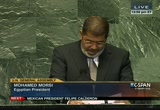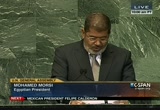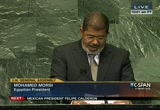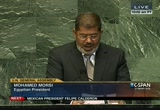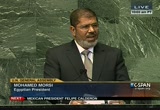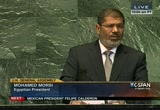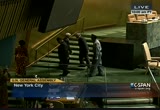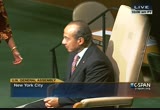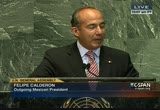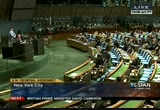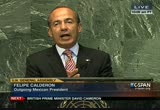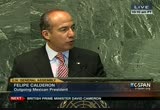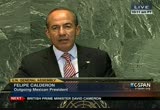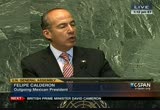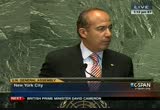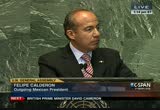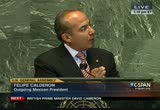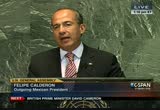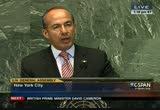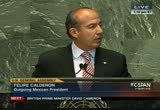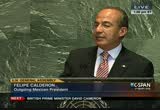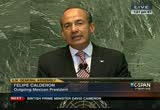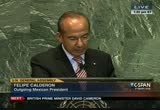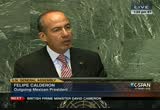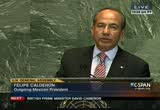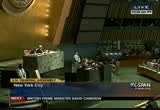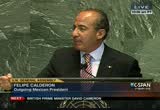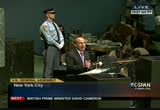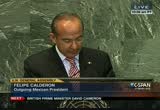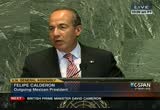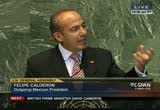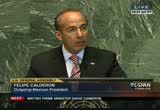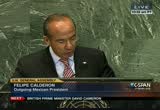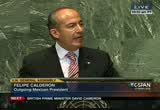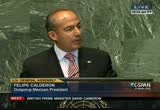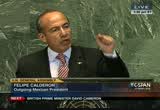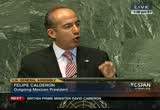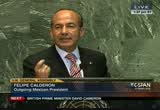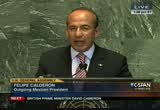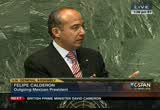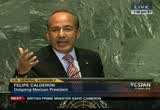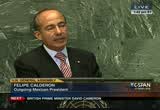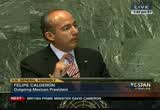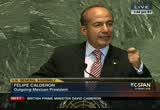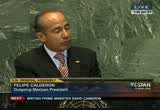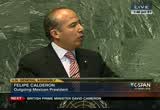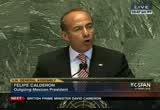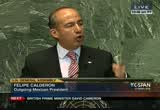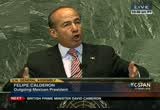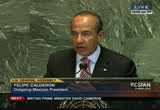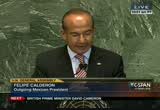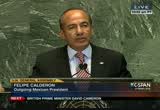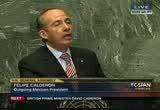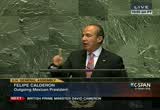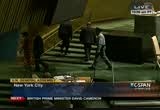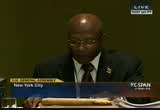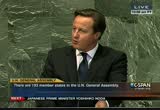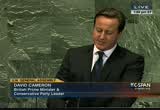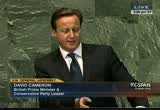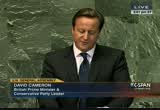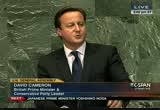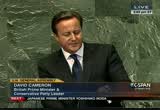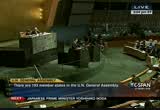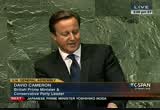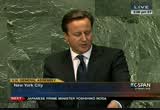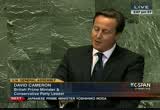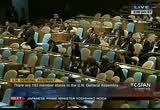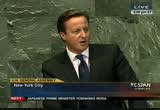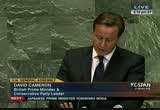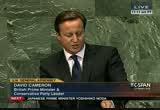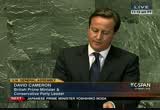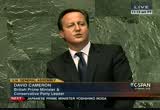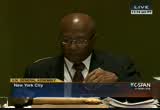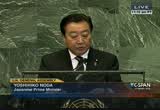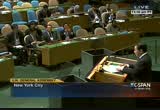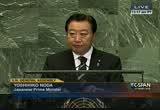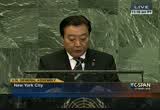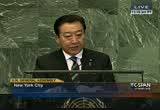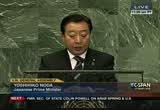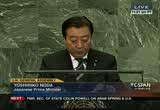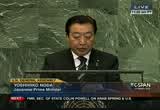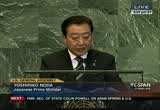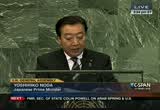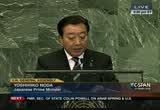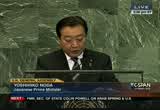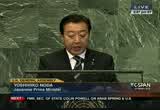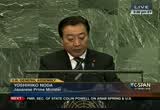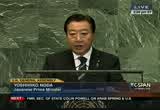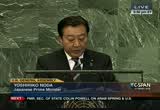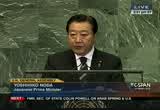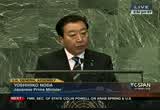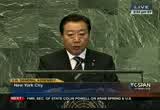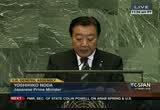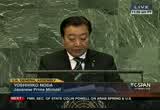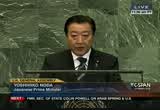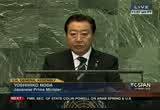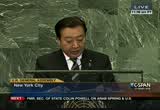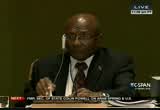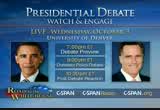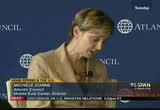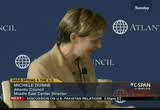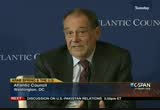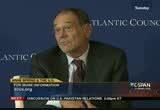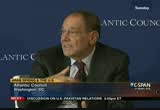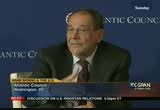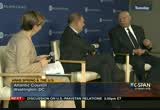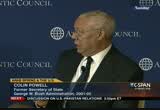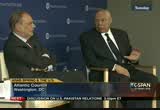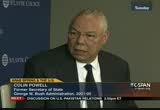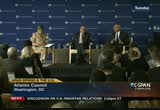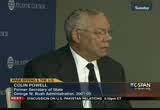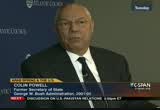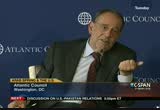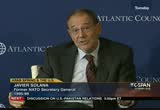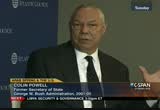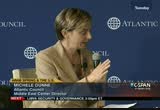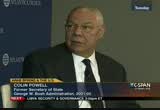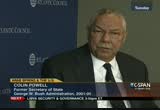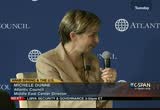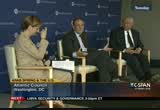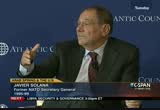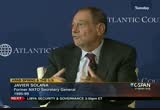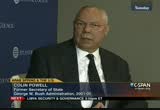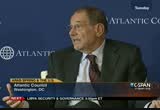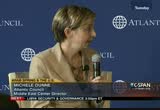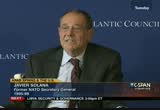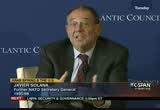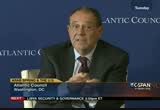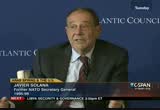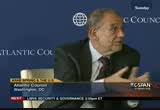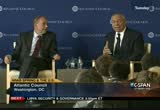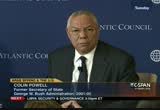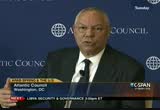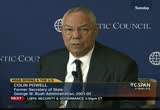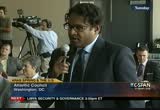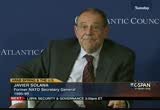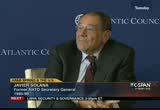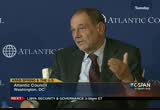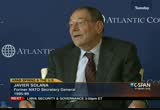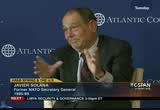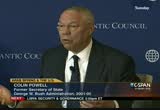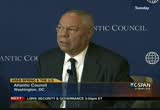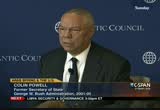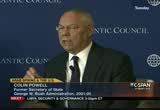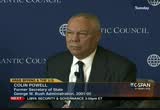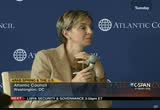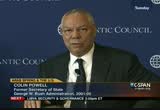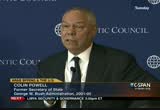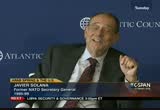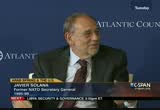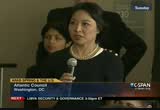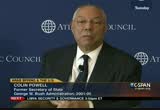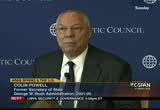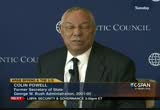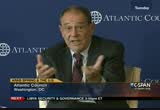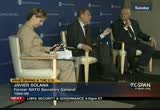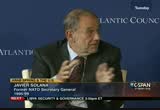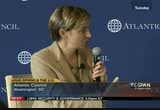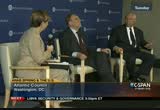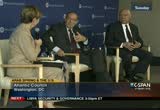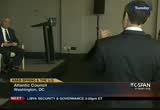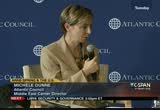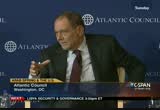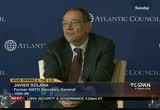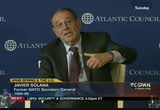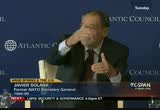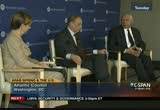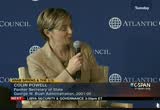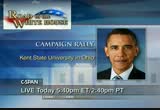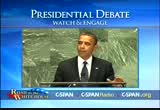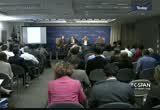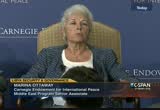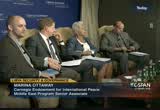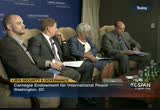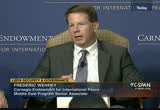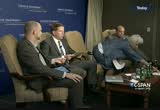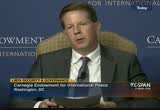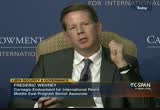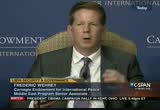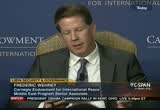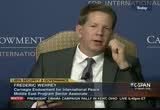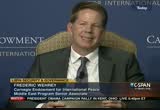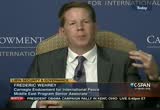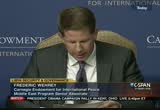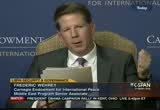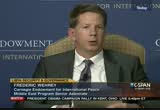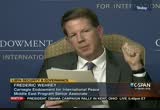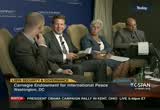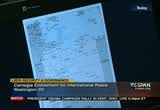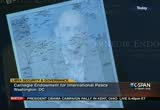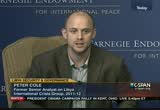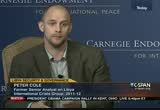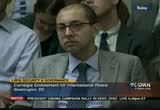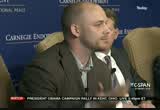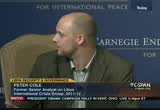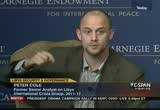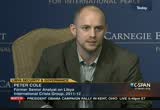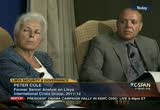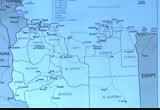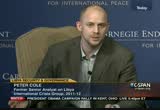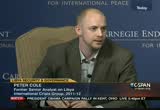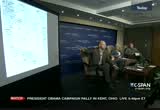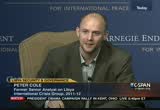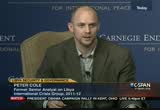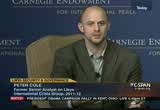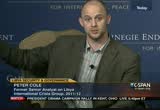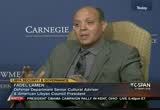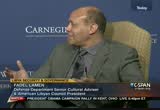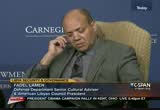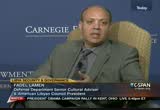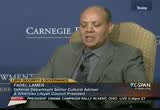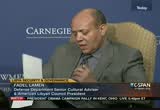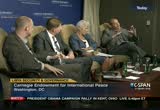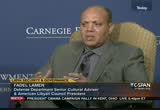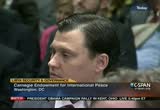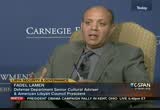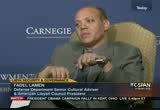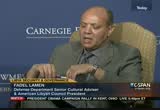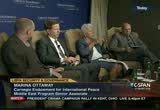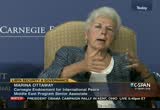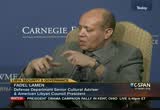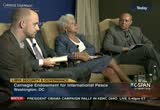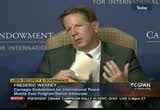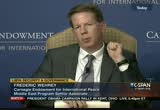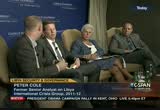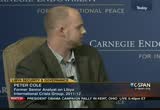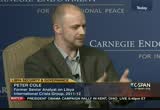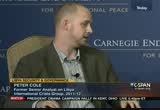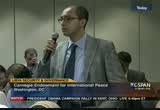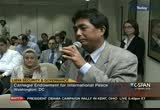tv U.S. House of Representatives CSPAN September 26, 2012 1:00pm-5:00pm EDT
1:00 pm
not a freedom of expression that targets of a specific religion or a specific coulter -- culture. a freedom of expression that tackles extremism and violence, not the freedom of expression that deepens ignorance and as regards others. -- disregards others. we also as we have said before, and we also stand formally -- firmly against the use of violence in objection to these sentiments. mr. president, before i conclude, i must say that if -- that the severity of the financial and economic crises must lead us to review the economic decision making process on behalf of people that
1:01 pm
do not participate in their preparation. they are the first to bear the negative consequences in growth and trade and environment, as well as on the social fabric of society. as a result of unfair trade rules and conditionality is composed -- in post. - imposed. there is a need for a new, local, economic government. i say there is an urgent need for a new global economic government, centered on people and aiming at consolidating cooperation between partners and development on the basis of
1:02 pm
mutual benefit and interest. mr. president? , i have laid before you our position, a vision shared by the egyptian people. i have also attempted to briefly outline egyptian views on the main issues, the divisions of the young and children, the women and the men in egypt, on all important questions in the middle east and the rest of the world. i am sure that the united nations is capable of addressing all global and regional challenges through dialogue and joined corporations in
1:03 pm
accordance with the principles of international law. egypt will spare no effort in dealing sincerely with all the members of this organization. we will always remain at the forefront of international endeavor, achieving freedoms and dignity for all people as well as social justice to all peoples including security and stability for all our countries. i look forward with optimism, great optimism and they see the piece that we call for prevailing all over this world, peace that is sed on justice, a piece that will give all the rights undiminished, a piece that does not discriminate between one and another for any reason. this peace will never prevail
1:04 pm
until we will cooperate, until we all realize that we are all equal and that we share many aspirations and ambitions. apeace whose message that bring to you, a peace of rights and justice, stability and development, interdependence, love and mutual respect. i don't believe this is difficult for all of us. if we extend our hand of cooperation, a sincere intention and the righteous work. god is our witness and we're hopeful that we will see a better future credits world. i thank you all and peace and
1:05 pm
prayers be upon you. [applause] [no audio] >> on behalf of the general assembly, i wish to thank the president of the general republic of egypt for the statement he just made may i request representatives to remain seated while we greet his excellency, the president. [inaudible] [applause] audio] [no audio] [no audio]
1:06 pm
1:07 pm
united mexican state to address the assembly. [applause] >> send your president take -- -- mr. president and head of state and ladies and gentlemen -- out of conviction and as a result of history, mexico is a strategic ally of the united nations. we were one of the founding countries of the united nations and as a founding country, we fully share its fundamental precepts, the precepts of our great organization. for me, this will be the last
1:08 pm
time i will be attending as the president of mexico. it will be the last time i attended the general assembly of the united nations. over the past six years, my country has taken part in very different fora to pave the way for you and initiatives. we have endeavored to strengthen the u n and make it the main body for dialogue and peace and for security and for the application of international law and, in particular, international law. we know full well that today the world is facing challenges which have threatened the very existence and viability of humankind. the first challenge is the current economic crisis and the urgent need to promote global development as well as trade and
1:09 pm
growth with job creation. this is a problem which has brought crisis to entire populations and which have prevented developing nations from overcoming their shortcomings in terms of poverty, illiteracy, as you know, mexico this year in 2012, we became a chairman of the g-20. our mission is very clear. we had to reconcile apparently opposing interests of the emerging countries and developed countries. as many of you know, in the previous meeting of the g-20, we were not able to make as much progress as we wanted in adopting measures to react to the international economy.
1:10 pm
that is why the mexican chairmanship decided to work hard to build a much broader consensus. we brought to the process the largest number of countries possible and listen to all the sectors we could, to the unions, to businessmen, to specific organizations, to young people as we brought all of their proposals to the pleary of the g-20. we had many administrative meetings. we have managed to bring divergent positions closer together. this was crucial to insure that the g-20 that we held in los cabos would seek -- would achieve the significant progress. months prior to this, there was a doubt as that -- as to the
1:11 pm
viability of the euro as a single currency for european countries. at the meeting, we endorsed with the support of the rest of the group, we endorsed a robust commitment not only to the bureau as a monetary unit but also to financial, physical, and political unity of europe zone. zone we brought in commitments from the international financial community. and also the international monetary fund. among the most significant achievement, i would point out that very ambitious action plan. it was a plan with a purpose of not only attacking the current economic situation but also to move forward toward a full and
1:12 pm
lasting economic recovery that we all yearn for. we also agreed there to provide the greatest contribution to the resources of the imf in the history of our organization. of more than $450 billion which were committed and available to help and a developing country that would face a critical financial situation. it is true that financial problems in some european countries are still lingering. these are long-term problems but, from our point of view, today there is a better promise of solution than what we saw before the g-20 meeting. this commitment on the part of
1:13 pm
the g-20 countries has been a valuable element. the global economy today is beginning to show signs of recovery, prospects for recovery, are optimistic prospects in the midterm but that we had barely year ago. that is why i believe in this area we are starting to see a turning point when it comes to the economic process. we should contribute to make sure this recovery will take place and take shape of a better commitment. this should not deter us. we must step up our efforts in order to overcome this global crisis and promote development in our societies. i would like to underscore that the summit of the g-20 did not only look at the international
1:14 pm
crisis and not just europe. we also dealt with pressing topics but also important topics. we wanted to make sure that countries would recover with croats and a sustainable approach. we put in several items of extreme importance. there is the green growth effort which i will refer to later, food security for our people, and financial inclusion for the poorest. almost 3 billion people in the world don't have access to financial services. this is a clear impediment to justice but also an obstacle to the efficiency and growth of our economies.
1:15 pm
in mexico, we have expanded access to financial services. today, banks offer accounts with -- to provide requirements. we are establishing a completely new cell phone bank which has reached 80% of the population. we are offering financial services to individuals in remote places. my government is also interested in not only programs to fight poverty and injustice but most of the support we are giving to the poor section of the population is done through true corp. efforts. the opportunity program is an innovative program which has economic transfers for 6.5
1:16 pm
million families. it is 1/4 of the total population of mexico. they are receiving monthly economic support to purchase food and satisfy their basic needs. when mothers take their children to schools and hospitals, this is the only way to structure the new circle of property. this report is delivered through debit cards and each of these cards are associated with an individual bank account. perhaps these people never had access to this before there are 6.5 million poor families and our country. we also contributed to food security. the increase in food prices around the world largely explains why from 2010 to the
1:17 pm
present time in northern africa and many parts of the world, people are taking to the streets beyond political reasons. if the poorset family's devote half of their income to food and that price was increased 20%, we're talking about impoverishment in the world which will be higher. one of the best ways to fight poverty is preventing this in our rise in food prices a round the world. we spoke about this in the g20, food security and we achieved grievances prominent crater vesture -- from a greater investment in technology.
1:18 pm
mexico was one of the first pioneers in the green revolution. now we need another green revolution and mexico wants to be an active participant in that technological transformation. this means providing food to the poorest sections of our population. at the g-20, we also showed the effort to find a solution to these toppled problems. -- topical problems. i would like to mention the bowls that the u.n. has established. -- the goals that the un has
1:19 pm
established. it is clear they encapsulate the yearnings of all of our people. country has had an unexpected rise in food prices despite the worst global economic crisis in memory. we have firmly made progress and -- in applying to those goals. mexico is to -- is complying with the mpg. three years from the deadline, we have realized what is a great advantage. universal health coverage, what does that mean? that means today mexico, we have doctors and medicine and treatment at hospitals for any
1:20 pm
mexican man or woman. this will allow us to comply and take it with us in the area of mother and child mortality, for example. this does a lot -- this allows us to tackle problems like hiv aids and distribute free retro viral patients to all hiv patients. not only have we achieved health coverage but we have provided universal coverage with a comes to primary education. today, every boy and girl between five and 13 years of age as an opportunity for free
1:21 pm
public school in cropp)? -- the gap between men and women in terms of primary education. we have achieved important programs. we build more than two hundred hospitals and clinics in six years. we have established 140 universities, new public and for universities where we are training engineers every year. we have also achieved progress in access to drinking water and access to information technology.
1:22 pm
and in access to decent housing. 650,000 is delivered every year to builders. globally, mexico is aware of the fact that progress is uneven. this should not be a reason to abandon our efforts. we must protect the progress we had made and make sure it continues. that is what mexico would suggest we moved toward a second generation that would be universal and measurable.
1:23 pm
this could involve gender equity, environmental protection, green education, food, an international coordination. this should be a central part of the post-2015 agenda. as far as global warming, it must involve multiple countries. if there is a drought or an president of flooding, if there is a drought or an unprecedented flooding, climate
1:24 pm
changes affecting all nations. this is a threat to human kind if we do not tackle this today. the consequences will be significantly greater. mexico has a responsibility as well as other countries when it comes to global warming. that is why we have set up a unilateral program, a special program to fight this. we endeavor to reduce carbon dioxide admissions by 50 tons this year. we're complying with conditions at this time. we are also the first country
1:25 pm
that delivered a national communication to the commission on private change. today, i will deliver on behalf of mexico, a friend or to mention on climate change. this does not only show what -- how we are complying but how we managed to uncouple economic growth from greenhouse gas emissions. are carbon dioxide emissions over two years has increased. it is 30% lower than the economic growth rate. we were experiencing a false debate which takes place.
1:26 pm
either we grow or tackle climate change. we either have poverty or and to global warming. i would say we must attack on both the same time. we're doing both things of the same time in mexico. for example, we have a program which pays for services. we are giving monetary compensation to pour an engine communities -- poor and indigent communities. cute paying them not to down trees or destroye.
1:27 pm
that will remain for us. this program is taking care of our forests and providing income to poor. in six years we've managed to plan for $1.3 billion of trees in this country. i remember a u.s. program about five years ago we took part in that program enthusiastically. we designated some protected national areas. according to f. a. o., mexico has reduced its nest -- forestation rate.
1:28 pm
1:29 pm
the greatest asset two countries is their national capital. the greatest wealth are our forests. carbon admissions come from deforestation. if developing countries need the support they need, we will be contributing to reducing carbon emissions and we would be helping to raise the income of those communities. this success shows the essential -- that it is in sight -- that it is essential. we managed to overcome differences. we have managed to set aside the
1:30 pm
perverse game of blaming each other for what is happening. rich people are not to blame. we're all responsible here. we all have to have the solutions. all are responsible for the crises we share. we clearly established that threshold of increasing no more than two degrees in temperature. also work with technology
1:31 pm
transfer. i'm going to speak about the topic and problem that is claiming the most violent deaths around the world. that is causing the deaths of thousands of young people particularly in latin america. this war -- this problem is transnational organized crime which has decimated thousands of young people and which is one of the most serious global threats
1:32 pm
of our time. these criminal organizations that operate networks around huge illegal flows not only of drugs but illegal flows of weapons and money, unacceptable human trafficking. this is to earn the income taken from honest citizens where they lived, they use violence. they are trying to control territory and overthrow governments. they are challenging the force of the state. they are taking advantage of the weaknesses for the clear
1:33 pm
institutional corruption to be able to act with impunity and oppose power. the become entrenched in communities can control everything they can. they take money from honest people and it extort businessmen and farmers and they are involved in crimes like extortion and theft. organized crime is one of the main causes of death, is violence which the united nations has an obligation to fight. it is one of the greatest threats for democracy. in the 21st century. mexico has suffered the consequences of this.
1:34 pm
there are also consequences of years of inertia while this crime expanded. that is what protecting families unprotected mexicans and protecting people from crime has not only a legal and constitutional imperative but a political imperative, an absolute imperative we have fought decisively and strongly and with courage. we are convinced that our main duty is to protect families. at the same time, we have fostered an escort transformation in institutions
1:35 pm
in charge of enforcing below. we are developing new and better police and the judicial powers. we require new and better capabilities that are able to defend liberty. however, we regret that this effort is not seem equally in other countries. i regret that the diplomatic conference that took place here last july did not reach any agreement when it came to the adoption of the arms trade treaty. it was to control the irresponsible sell powerful weapons to transnational organized crime.
1:36 pm
for the last six years, we have decommissioned more than 150,000 weapons. that is why mexico was out to regulate the transfer of such weapons. we know there is a risk that the arms could end up and don't go to the hands of good citizens who want to defend themselves but they end up in the hands of criminals. they commit horrible an unprecedented violations of international law. arms trafficking is only one factor of a very complex problem. today, we have to acknowledge an undeniable truth --
1:37 pm
illegal drug consumption in many developed countries is killing thousands and thousands of young people in production and transit countries. it is creating violence which people don't deserve. drug-consuming countries have not made progress or have not made enough progress when it comes to reducing consumption. there is much work to be done in terms of reducing the demand and preventing addiction. we need to step up our efforts to deal with this public health problem. we need preventive policies which fight addiction and media and information campaigns which can reach young people around the world and make them understand that addiction, drug
1:38 pm
addiction, is the new slavery of the 21st century. this is a heavy chain that ties us down. the greater power of criminal organizations, where does it come from? it comes from the billions of dollars of economic resources which are flowing from the main drug consumption countries. if we don't stop this mountain of funds, organized crime will continue -- to undermine and will continue to challenge entire societies and governments. that is quite hear - here in
1:39 pm
this assembly, i would like to say clearly that the time has come for countries to honestly and sincerely assess if they have the will and the ability to do so. they must try to reduce drug consumption significantly. otherwise, if they cannot reduce this consumption, the most urgently take strong action to let least reduce the exorbitant flows of currency that are ending up in the hands of criminal organizations. thus far, we have followed a
1:40 pm
well-intentioned approach to keep drugs out of the hands of young people. there's a fundamental problem to this. this leads to a black market and the enormous earnings which have been prompted by a prohibition and which comes from the black market. this has increased the ambition of criminals and increased the massive resources. this allows them to create powerful networks and give them an almost unlimited ability to corrupt. they are capable of buying an entire police force or a government, leaving society's defenseless, leaving defenseless families especially in the poorest countries. a powerful country could have a strong authority.
1:41 pm
they could have unbeatable police forces. what about the poorer countries? i'm talking about countries in the latin american area and what will happen in asia and africa that don't have the economic power to tackle the criminals? the growing drug demand is giving criminals and economic power which, in some cases, is turning into political power. furthermore, i would like to stress that all this money that gives them ambition, they will sweep away any scruples and atrocities and the worst acts of cruelty that humankind has seen.
1:42 pm
the money that comes from consumers claims the lives of thousands of innocent people in latin america and the caribbean. as a result of the violence associated with drug trafficking. we nations are suffering the devastating effects of this situation. especially the nations that are between the production zone and the largest consumption market in the world which is the united states. that includes colombia, guatemala, jamaica, all of them. that is why, friends, in december of last year, we met the heads of state in government of central america with mexico
1:43 pm
and colombia. there we issued a very important declaration. the merida declaration where we express the urgent need to achieve a significant reduction in illegal drug demand from consumer countries. we also said if it is not possible, then the authorities of those countries must, therefore have a moral obligation to explore all alternatives to eliminate the exorbitant earnings of criminals including exploring regulatory or market options which are directed to defend. not only that, but we all met a
1:44 pm
later in the framework of the six some of the americas in columbia. several leaders from latin america reiterated our concern. we reached a central agreement to give a mandate to analyze on scientific evidence and give all the options that will allow us to come back to scourged more effectively. we also agreed unanimously and establishing a situation to combat international organized crime. today, i am proposing formally
1:45 pm
that this organization, the united nations, make a commitment that they carry out a far reaching assessment of the programs and the limits of the current prohibitionist approach when it comes to drugs. this does not mean we must let down our guard. nor will we give an inch to criminal organizations. it means that country's must assume their common responsibility in this area. originordance with the and abilities country has. in any case, regardless of the regulatory framework when it comes to drugs, i'm convinced
1:46 pm
that the developing countries will be called upon to implement a comprehensive policy. this is to combat crime and not to run away from crime and to establish their territories. it is also to strengthen law enforcement agencies and institutions. in particular, we have to clean up and purge and strengthen our police forces, prosecutors, public prosecutors, and the judicial board. we have to restore the social fabric. we have to swiftly expand opportunities for young people. we have to have done here is in the opportunity of food. we have to do it through
1:47 pm
universities and musical groups, soccer teams and prevention clinics. we need to have active and massive position entry. this is what we are already doing in mexico. we're doing this in our country along these three lines. this is crucial for any democratic state regardless of it is a position or policy. we have to have better law enforcement situations and create opportunities. today, i will call upon all nations here in the united nations to assume their responsibility.
1:48 pm
that we have not taken on. the main cause of violent death and the world is a result of organized crime. it developed countries are the ones that consumed tons of drugs on a daily basis, they should stop the money that is being sent to criminals. there is a flow of money which the criminals are financing themselves. it is the time to explore a different alternatives when it comes to reducing consumption. it is a time for validation to take part in this. united states has to lead far
1:49 pm
reaching international debate. we have to study all the human violence which is unacceptable and generated by the production, distribution, and trafficking of drugs in the world. and which has made latin america and the caribbean the most violent region in the world. this assessment must be done honestly and rigorously and with coal responsibility. we have to destroy their alternatives. we have to explore regulatory
1:50 pm
more federal traditions. -- explored market alternatives. while the united nations studies and provide solutions to problems, as the tools with starvation -- as it deals with the starvation in africa and epidemics such as hiv, as we should deal with climate change. it is now time as well to enter into action to stop this wave of debt which is causing so much suffering to our people. i respectfully urge the united
1:51 pm
nations to not only take part but to lead a discussion whether it is up to the challenge for the 21st century. it would lead all this to seek solutions to this very problem news in -- using new and effective solutions. my government and a few months will come to an end. i am proud of the fact that mexico now has a robust economy which is growing and is generating 700,000 new jobs in our country. mexico is stronger today and this is shown by our human development indications how of employment is.
1:52 pm
as a global community, we need to strengthen the united nations from the inside so it can meet global challenges. the initial test is a realistic reform of the security council to make it more representative and preserve its capacity for action by improving its working methods and improving the accountability of its members. we welcome the fact that you have proposed the peaceful settlement of the beats -- disputes for this session. mexico is committed to corporations. , to development of agreements. there are concerns about the
1:53 pm
weakness of the inertia of business organizations and it comes to international law violations. this is a serious situation in syria, for example. we condemned the repression at the damascus. we must renew our political will to change your organization. we have transformed and refurbish the united nations building and it also is
1:54 pm
important to bring it up to the requirements of the 21st century. we also condemned the preventative terrorist attack against the u.s. in benghazi and the killing of the u.s. ambassador and of several of his assistants. mr. president, i reiterate that mexico will amply comply with the laws established by this great organization. this can be seen in our human development indices win all areas. when it comes to security, we have fought decisively against criminal groups. we have updated and carried out a thorough restructuring of our institution while at the same time, looking forward to
1:55 pm
building a democratic culture. today in mexico, a reform has been passed or any human rights recognizing any international treaty, it is an internal law. and i am proud to be leaving mexico which has close relationships of friends and cooperation in all countries. we want freedom for men and women, justice and respect for human rights in our society. we want an environment that is respected and allows our dear planet to live forever and we wanted to have democracy without
1:56 pm
which there is no freedom. we desire peace on earth to all men and women of goodwill, peace to well below, thank you very much. [applause] >> on behalf of the general assembly, i would like to thank the president of the united mexican states for his statements. may i request representatives to remain seated while we greet the president.
1:57 pm
[no audio] [no audio] the assembly will hear a statement by his excellency, the right hon. david cameron, prime minister of the united kingdom of great britain and northern ireland. a request protocol to escort his excellency. [no audio] i have great pleasure in welcoming the prime minister of the united kingdom of great britain and northern ireland,
1:58 pm
his excellency, the right hon. david cameron, and invite him to address the assembly. >> thank you, mr. president. ladies and gentlemen, i am proud that this year, britain welcomed the world to the olympic games and put on a great display showing that while we may only have the 22nd largest population of the world, we can roll out one of the warmest welcome in the world. i am honored, too, that in this coming year, have been asked to co-chair a panel to build on one of the united nations greatest achievements with millennium development goals. britain takes its work very serious. i am convinced that we need to focus more than ever on the building blocks that take countries and people from poverty to prosperity. by these building blocks, the absence of conflict in
1:59 pm
corruption, the presence of property rights, and the rule of law, we should never forget that for many in the world, the closest relative of poverty is in justice. development has never been just about eight or money. i am proud that britain is a month -- a country that keeps its promises to the poorest in our world. mr. president, one year ago, i stood here and argued that the arab spring represented an unprecedented opportunity to advance peace, prosperity, and security. one-year along, some say the arab spring is in danger of becoming an hour of winter. they point to the riots in the street and possible descent into a bloody civil war and the lack of economic progress and the emergence of newly elected islamist-led government across the region. i believe these people are in danger of drawing the wrong conclusion. today is not the time to turn
2:00 pm
back but to keep the faith and redouble our support for open societies and for people demanding a job and a voice. yes, it is challenging but democracy is not and never has been about simply holding an it is not one person, one vote, once. it is about establishing the building blocks of true democracy. the independence of the judiciary and the rule of law. defend the rights of the minority. the freedom of the media. a proper place for the army in society and the development of the affected institutions, political parties, and wider civil society. i am not nighties in believing that democracy alone has some magical healing power. if i am a liberal conservative, not a neo-conservative. if i respect the histories and
2:01 pm
traditions that each country has. i welcome steps taken in each country where reform is happening with the consent of the people. i know that every country takes its own path and that the progress will sometimes be slow. sometimes they achieve stability and success. others have endured decades in which the institutions of civil society would deliberately destroy. political parties banned. free media abolished. the rule of law and twisted for the benefit of the few. we cannot expect the damage of debt is to be put right in a matter of months. but the opportunity for justice and the rule of law, the hunger for a job and a voice are not responsible for the problems in the region. in fact, quite the opposite. the building blocks of democracy, fair economies and open societies, are part of the solution -- not part of the problem.
2:02 pm
we at the united nations must of our efforts to support the people of these countries as they build their own democratic future. let me take the arguments in a turn. a first of all, there are those who say there has been too little progress had and the arab spring has produced few tangible improvements in people's lives. this is not right. look at libya since the fall of gaddafi. now plans to integrate the police and army. none of this is to ignore the huge and so bring challenges that remain. the murder of ambassador chris stevens was a despicable act of terrorism, but the right response is to finish the work that chris stevens gave his life to. that is with the vast majority of libyans want to do. if we saw that so inspiring last weekend as they took to the streets, refusing to allow extremists to hijack their chance for democracy.
2:03 pm
the arabs rain has brought progress in egypt where they have a certain civilian control over the military. where a elections have brought new governments to power and in morocco where there is a new institution and a prime minister appointed on the basis of a popular vote for the first time. even further, somalia has taken the first step forward by electing a new president. there has been progress and none of it would have come about without people standing up last year and demanding change or without this united nations having the courage to respond to their cries. second, there is the argument that the removal of dictators has somehow started to unleash a new wave of violence, extremism, and instability. some argue that in a volatile region, only an authoritarian strongman can maintain stability
2:04 pm
and security. even some argue that recent events prove that democracy in the middle east primps terrorism, not security and conflict, not peace. again, i believe we should reject this argument. i have no illusions about the danger that political transition can be exploited by violent extremists. i understand the importance of protecting people. britain is determined to work with our allies to do this, but democracy and open societies are not the problem. the fact is, after decades, too many were prepared to tolerate dictators like gaddafi on the basis they would keep their people say at home and promote stability in the region and the wider world. in fact, neither of these things were true. not only were these dictators suppressing their people, ruling by control is not consent, if
2:05 pm
clambering but well and deny people their freedoms, they were funding terrorism overseas as well. the brutal dictatorships made the region more dangerous, not less. more dangerous because these regimes dealt with frustration at home by whipping up anger against their neighbors, against the west, against israel. people denied a job and a voice were given no alternative between dictatorship or extremism. what was heartening about the events of the square was that the egyptian people found their voice and rejected this a false choice. they withheld their consent from a government that lost all legitimacy and instead chose a road that is more open and fair society. this road is not easy, but it is the right one and will make countries safer in the end. the next, there are those that will say that whatever may be
2:06 pm
achieved elsewhere, in syria, the arab spring has unleashed a vortexes with the potential to destroy the region. syria does present some profound challenges. they have got it the wrong way around. you cannot blame the people of a brutal dictator. the responsibility is with the brutal dictator itself. just as his father did in the slaughter 30 years ago. not only in syria, he has concluded with those and i ran -- iran. moved forward to political transition and not give up the cause of freedom. the future for syria is a future without assad. it has to be based on mutual
2:07 pm
consent as was clearly agreed with the geneva in june. if anyone is in any doubt about the doubt aboutassad rejectthat ass -- assad has inflicted on his people, just look at the pictures. i have seen a children slaughtered. no, i do not think i will ever be ok again. if there was, this child said, even 1% of humanity in the world, this would not happen. the blood of these young children is a terrible stain on this united nations. in particular, it is a stain on those who have failed to stand up to these atrocities and in some cases aided and abetted regime of terror.
2:08 pm
we must now joined together to support a rapid, political transition. at the same time, no one can turn a deaf ear to the voices of suffering. security council members have a particular ability to support syria. britain, already the third biggest honor, is investing in humanitarian support and helping syrian children. we look to our international partners to do more as well. of course, the arab spring has not removed overnight the profound economic challenges that these countries face. too many countries face falling investment, rising food prices, and bigger trade deficits. it is completely wrong to suggest that the arab spring has somehow created these problems. it is a challenging time for the world economy as a whole. there was never going to be an
2:09 pm
economic transformation overnights. a far from being successful, open market-based economies, many of these countries were be set by the vested interests, corruption, and unaccountable institutions. and this created a double problem. and not just a fragile economies, but worse, people who were told they had experienced free enterprise and open markets when they had experienced nothing of the sort. we must help these countries on wind of this legacy of corruption, military expenditure they cannot afford, natural resources unfairly exploited, and what they suffered under for too long. while on the subject of stolen assets, we also have a responsibility to help these countries get back the stolen assets that are rightfully theirs, just as we returned and billions of dollars of assets to libya. it is simply not good enough that the egyptian people
2:10 pm
continue to be denied these assets long after mubarak is gone. today, i am announcing a new british task force to work with the egyptian government, to gather evidence, to work to change the law and to pursue the legal cases that will return the stolen money into its rightful owners, the egyptian people. finally, and perhaps, most challenging of all for western countries like mine, is the argument that elections have simply opened the door to parties whose bodies are incompatible with truly open societies. my response to this is clear. we should respect the outcome of elections, but we should not compromise on our definition of what makes an open society. we should judge them by what they do and attest to this. will you entrust the rights of citizenship to your countrymen and women who do not share your specific political and religious view? you accept, unlike the dictators
2:11 pm
to replace, but you should never pervert the democratic process to hold onto power if you lose consent of the people you serve? off when you bought your commitments to protect the rule of law for all citizens? off to defend the rights of christians and minorities? and to allow women a full role in society in the economy and in politics? the truth is this. you cannot build strong economies, you cannot build open societies and inclusive political systems if you lockout women. the eyes of the world today may be on the brothers, but the future is as much in the hands of their mothers, their sisters, and their doctors. it must also mean that their attempts to undermine the stability of other countries, or if they encourage terrorism instead of peace, if they promote conflict instead of partnership, we will oppose them. that is why iran will continue to face the full face of
2:12 pm
scrutiny from this united nations and spread a nuclear shadow across the world. it is also why they should not waver palestinians should have the chance to fulfill the same aspirations for a job at a voice as others in the region. to live in peace and security with their neighbors. so, of course, there are challenges, working with governments that have different views and traditions, but there is a fundamental difference between islam and extremism. it is a great religion observed peacefully by over 1 billion people in our world. the extremism is a worked political ideology supported by a minority that seeks to hijack
2:13 pm
this great religion to gain respectability for its violent objectives. it is vital that we make this distinction. in turkey, we see a government with roots and islamic values. but one with democratic politics, an open economy, and a response supporting change in libya and elsewhere in the nation. i profoundly believe the same path as open to egypt. we must help them to take it. democracy and is long can flourish along one side -- alongside one another. let us in a game with -- lesson date with a new democratic government so their success can strengthen democracy, not undermine it. mr. president, there is no doubt the we are in the midst of profound change and that many uncertainties lie ahead, but the building blocks of democracy,
2:14 pm
fair economies, are part of the solution -- not the problem. indeed, nothing has changed my fundamental condition. the arab spring represents a precious opportunity for people to realize their aspirations for a job, for a voice, and for a stake in their future. we come in this united nations, must do everything we can to support them. thank you. [applause] >> on behalf of the general assembly, the prime minister of united kingdom of great britain for the statement just made at request protocol to escort his excellency. the assembly will hear a statement by his excellency, yoshihiko noda, prime minister of japan. i request protocol to escort his excellency.
2:15 pm
i have great pleasure in welcoming the prime minister of japan, his excellency, yoshihiko noda, and to invite him to address the assembly. >> mr. president, ladies and gentlemen, first, i would like to express my sincere appreciation for his dedication as president and his excellency. his assumption. i would also like to pay my deep respect to his excellency for
2:16 pm
his leadership. one year ago, i started my speech on this podium by conveying an outpouring of appreciation of the world. it has been one year and a half since the great japan earthquake in march of last year. the people are making strenuous efforts to revive their home town with a unyielding spirit. generous support from all over the world, we, the japanese, the vowed before the souls of the victims to hand down the lessons learned from the disaster. to succeeding generations beyond our national borders. japan will continue sharing this with the world in order to build a society not too disastrous and
2:17 pm
to make nuclear safety. the conference on nuclear safety is scheduled for the end of this year and is sponsored by the agency and the third united nations world conference. we will also provide meaningful opportunities mr. president, the warning from nature will, by the unprecedented earthquake and a massive a tsunami as to how we should sustain our civilization. since the moment of their birth, but human beings have consumed their own wisdom into power to survive harsh, natural
2:18 pm
environments. but despite a advanced technology, forces of nature have reminded us how human beings are weak and have a fragile existence. human existence lies in advanced civilization itself and not only in nature. there are i 8 number of examples of tricks, such as mental retardation, terrorism, and proliferation of nuclear weapons. what is required for the human species to be able to keep its species on earth and continue
2:19 pm
peace and prosperity. the answer is clear. humans must get wiser. and this is it. humans have so far gained abundant knowledge. the information and communication technology revolution unfolding in front of us is building up human knowledge of further on a geometric scale and an explanation speech. human wisdom seems to have improved dramatically. however, it is not true. working in the forefront of a long human history, we are living in a period of complicated and violent change. patience among nations of reason in many parts of the
2:20 pm
world with more uncertain future prospects. the real test for us to survive in this unprecedented. -- in this unprecedented period is not just the information we have, but to learn what human beings have accumulated. mr. president, the first of such wisdom, human gains, was power to give adequate sort, not only the now, but also the future. also, the future of generations. we called your society which prompted human beings to open was made possible through the long term perspective during the future that human beings acquired when they waited for the harvest, instead of thinking solely about immediate concern.
2:21 pm
now it is time for us to build a sustainable future for the sake of succeeding generations. many countries have viewed the massive fiscal deficits. it is now a common challenge. if people cannot overcome deficits by cutting spending and trying to increase revenues, future generations will be forced to deal with their deficit. this structure is not about current generations exploiting future generations. democracy is historically proven in this political system, however, we are faced with an enormous challenge about whether or not democracy can serve as a system to keep fairness between generations across the globe.
2:22 pm
under the parliamentary democracy comprised of representatives serving people living now, there is no guarantee when it comes to the interests of future generations. the structure invites politics of future generations and problems of. we are all responsible for the next generation. the challenge facing us must be resolved by our generation. political leaders must take charge of their responsibilities now for tomorrow. in order to protect sound, a democratic society, now is the time to exert the power to think about the benefits of a future generations. over the past 20-odd years,
2:23 pm
japan repeatedly procrastinated in politics and was considered a symbol of a country that delayed decisions, but i pledged to change the politics of japan and state my political life on the realization of comprehensive reform. this reform is an ambitious package of policies made to support japan's a social security system by maintaining a stable financial basis in the face of a rapidly facing -- rapidly changing nation. it is a comprehensive reform. japan is taking a firm step as a country that makes the decisions without discerning the difficult issues. mr. president, another pearl of wisdom that you have acquired was the prospective of looking
2:24 pm
down at the entire earth where we live. i recently had an opportunity to communicate directly with an astronaut during his stay in an international space station to my office. at the time, who is attending with us. -- what space is not have is air and gravity. what this space have the earth does not? the astronaut replied, a perspective of looking at the earth from outside of its. this conversation expressed in simple terms what i want to say today. because we have obtained the perspective of looking at the
2:25 pm
earth from outside, cumins at last shares the sublime a mission to protect the global environment. we must return to this perspective going beyond and advancing the earth's environment, the basis of the survival of human beings. in an effort to protect the global environment, the outcome was achieved for sustainable development in june of this year. japan announced the green initiatives, proposing that we explore sustainable growth and prosperity without the supply and demand crunch of natural resources and energy. japan realized a low carbon and sound material society facing the world. we need more innovation in
2:26 pm
energy and renewable energy. in light of the accident on march 11 last year, the companies in japan aiming at realizing a society not dependent on nuclear power ending in the 2013's and will reexamine the politics, including the international situation. we will mobilize all sources to demonstrate to the world a model of economic growth. we must direct our attention.
2:27 pm
directed at the un general assembly this month, can be in visiting the next generation and allowing people. -- and young people. japan is determined to continue the worldwide efforts in order to establish -- the idea of human security must remove emphasis on the african continent which has potential development but is still suffering from many challenges such as natural disasters and conflicts. the location of the fifth tokyo conference were taken in june next year, japan discussed the
2:28 pm
actions japan and the international community should take. we must completely resolve challenges that place our precious lives in danger. it is making its efforts for reconstruction after the long award. it has taken steady steps toward democracy. japan will make every possible effort to support the peace building and human security in each region. it is this pearl of wisdom that you have obtained in which human beings schedule disputes reasonably. human beings have acquired language and wisdom, but they have a failed to resist temptation to solve conflicts by
2:29 pm
force, even in modern times. despite a two world wars and ethnic bombs dropped on hiroshima -- and atomic bombs are dropped on hiroshima, and weapons of mass destruction and terrorism continue to be issues. as nuclear and missile issues in the republic of korea and iran currently cause a serious threat to the entire world. it is indispensable for each country to coordinates, including that the security council resolution urged both to take concrete actions. japan, the only country that has experienced the horror of nuclear devastation, we will continue to carry out a mission of seeking a world free of
2:30 pm
nuclear weapons. it prevents the validation of basic human rights. it is a matter of great concern to the entire international community. realize the return through strength and coordination. japan maintains to resolve a standing. in accordance with the declaration, japan urges -- humans have done more. we also have the skill of solving conflicts. this is for the world. the responsibility to protect and ensure the safety of
2:31 pm
sovereignty. japan has responsibilities in accordance with national laws. meanwhile, as globalization proceeds, challenges in the community are getting increasingly complex. between nations, it can easily get tense. at this critical killed actor, who -- at this critical juncture, the rule of law is essential to presenting and resolving conflicts in a peaceful matter. they play a critical role in maintaining a stable and predictable society. it must be further enhanced by the natural use of forced is inconsistent with the fundamental spirit of the united nations charter.
2:32 pm
this is against the wisdom of human beings that is acceptable. it is important to try it developing and ensure it gets implemented more effectively. i strongly call for leaders to strengthen the rules for more peaceful and stable international communities. we're actually witnessing conflicts within nations been settled based on international law. a typical example would be in the system of the world, the mechanism made it possible for states to solve trade disputes with a common language of laws not by force.
2:33 pm
japan has always a valued the rule of law and the strengthening of it. japan consistently recognized and took the lead in practicing the rule of law. japan is leading the world in its personnel and financial contribution to financial institutions. japanese judges have served at the international tribunal for the law of the sea and in the chamber in cambodia. japan has provided the largest financial support. financial support to cambodia at
2:34 pm
the moment. supporting the united nations in promoting the rule of law continues to be a huge challenge. i call for the nations to recognize the compulsory jurisdiction and for non-member countries of the law of the sea to join at an early date. there are still a number of disputes in many parts of the world. it is a philosophy of the charter of united nations as a shared principal in the international community to settle disputes in a peaceful matter based on international law. japan, under any circumstance, is determined to comply with the principal and seeks it based on
2:35 pm
international law. the world should pay more attention to the role of the -- the role the institution can play. still in a tumultuous whirlpool, though they are moving toward an establishment of democracy. and japan will continue to support democratization. they continue violence and oppression in syria as well from the perspective of the rule of law. japan strongly condemns the attacks in syria robbing tens of thousands of innocent citizens and journalists, including a japanese journalist. there is more pressure on the government of syria to extend
2:36 pm
assistance to the people. let me emphasize that civilians must be protected and workers of international places must be secured in the international community which will ultimately be of help through the rule of law today. the violence against this principle must not be tolerated for any reason. the concept is the foundation for the stable and reliable society, making it movement of people more vibrant and a serving as the basis of prosperity. i believe it can be an important opportunity that brings order and prosperity, centering on the asian pacific region. japan will expand investment,
2:37 pm
build order, including safety of navigation and create order for prosperity. those needed in the international community are not simply for individual problems. orderly relations between nations or within organizations require the rule of law, mainly enhanced govern. a list of nations with responsibility in their respective capacity, we cannot overcome the various common challenges confronting the world. in particular, i hope that countries will fulfill their responsibility with each national power. it is important that we engage in throw discussion on how the
2:38 pm
united nations should develop in the future. armstrong was support reform on the united nations. also, the security council must be in doubt with legitimacy that reflects the reality of the world today. in order for the council to be fully effective, japan is ready to take on greater responsibility in the international community. it now is the time to accelerate the process and start the conversation. so far, i have mentioned three pearls of wisdom necessary. i have conveyed it japan's contribution. i believe human beings will continue adapting to this society and get wiser. future generations and assault
2:39 pm
disputes calmly by recent under the rules. let us take charge the lofty task of us to carry out and set a course for human beings. i should like to conclude my remarks by pledging to all of you that japan will stand at the forefront of the future of human history to a peaceful and affluent society. thank you very much for your kind attention. [applause] >> on behalf of the general assembly, i wish to thank yothe prime minister of japan for the
2:40 pm
statement he just made and call for the -- >> you can see all of this week's coverage from the united nations assembly. those speeches available in our video library at c-span.org. our live coverage coming up later today on c-span, president obama back on the campaign trail today in ohio. stops this afternoon. early voting begins in ohio. we will have the president's remarks this afternoon live it 5:40 eastern. next week, watch and engage with c-span as the presidential candidates made in the first debate from the university of denver, our live debate preview begins at 7:00 p.m. eastern. the 90 minute debate with questions focused on domestic policy. after the debate, your questions, comments, and tweets.
2:41 pm
>> september 11, 2001, was a day that changed my life forever. it changed america's life. i'll go through a power point presentation that will outline the account, the historical account of the attacks as things happen that day. a lot of things happened very quickly. i will do my best not to ramble on and go too fast. i will ask you to sit back, clear your mind, put yourself in that room, and you get a real sense of what it was like to get the top of the food chain, the national command authority as a nation of 300 million americans was attacked by 19 al qaeda terrace. >> if more from retired lt. carl robert -- inside the president's bunker. sunday at 7:30 p.m. eastern on
2:42 pm
c-span 3. >> i watched c-span, every time, especially when advance are going on. any time something is going on, i want to watch c-span because they typically have the best, most unbiased view of whatever is happening. if i wanted spun in a circle, i will watch one of the other news organizations. i love c-span. i watch it on tv or on line. if something is going on, i always turn to c-span. i cannot have a favorite show. it is is anytime i need to know what is going on, i know that c- span will have the real story. >> josh truitt watches c-span on direct tv. brought u.s. a public-service by your television provider. >> now, former secretary of state, colin powell, on the
2:43 pm
aftermath of the arab spring and the role of the u.s. in europe from the atlantic council in washington. this is one hour. [applause] >> thank you. good afternoon. welcome, everyone. i am really so pleased to be here today. i extend warm things to the doctor and general powell for being with us to discuss this topic today. as most of you are probably aware, president obama devoted his un general assembly address today to our subject. he began with the killing of ambassador chris stevens and went on to discuss the wave of change sweeping the arab country
2:44 pm
and problems related to the struggle over freedom of expression and religious tolerance. discussing support for uprisings, president obama said, we have taken these positions because we believe that freedom and self determine -- determination are not unique to one culture. these are universal values. even as there will be huge challenges that come with the transition, i am convinced that a government of the people and by the people is more likely to bring about the stability, prosperity, and individual opportunity that serves as a basis for peace in our world. what are we actually doing to implement these values? what are we actually doing to implement these values? dr. javier solana, i will like to
2:45 pm
begin by asking you from the point of view of the most senior of european diplomats and statesman who obviously watched u.s. policies for quite a while now, what do you think? is this the correct stance for the united states? are we implementing it and what about europe? how is this you did in europe and what does europe doing in terms of engagement with the arab region got to mark >> thank you very much for the invitation. -- with the arab spring. >> thank you very much for the invitation. i am very happy to be here. it is difficult to judge from outside the policies of the united states but in this case, i have a very clear.
2:46 pm
i think what president obama did was correct. the european union collectively did the same. i did try to work in the same direction. at that we have done what he had been able to do together in the right direction. the first was tunisia, than he did, and a complicated situation -- then egypt, then it difficult and complicated situation in libya. have we done enough? i think probably not. we have not done enough in helping. when you look at money, this is an important role in these countries in which a lot of the problems are linked to lack of hope for the younger generations, etc.
2:47 pm
if you look at the amount of money and put it to the value of today, it will be the -- about ten times more than what we have spent in this period of time in the countries of the mediterranean. in 1995, the was an engagement in the european union and the south part of the mediterranean, including also the palestinians and israel. we spent that time a good amount of money but we are not able to do what later on the people of tunisia and cairo
2:48 pm
need. i think we were not able to get -- to listen to the wills of many people that wanted change who are not favored to do that. but they did it and now we have to help. the second question is an experience i have had. the united states today has consequences of a movie. i had to deal with that on behalf of the european union.
2:49 pm
we had people killed. we had a big -- big events. we will win his battle, i think, and be able to continue to give hope to millions of people. we have to recognize the differences in the will to live together. >> general, let me turn over to you. dr. javier solana thinks the united states and europe have expressed the right attitude toward the changes in the middle east but perhaps have not done as much as for given as much economic assistance as we should have. how do you see it? should we be more actively engaged? >> i would like to it -- respond by offering a broader context. not just what effect to what happened to our distinguished
2:50 pm
ambassador. it is a much broader picture. first, let me say i am delighted to be here with you and pleased to be with my wing man for many years, dr. javier solana. recreated the quartet in spain -- we created the quartet in spain many years ago. when i look at the region and about what the president said today, he was expressing universal rights that all americans believed in. life, liberty, freedom, democracy. and they are universal but not necessarily accepted universally in every country. so you have to realize that it is not one uniform world out there we are dealing with. but i always like to say in putting it in context, you take those universal values and bring them up to date. i will start with 1975 and the
2:51 pm
helsinki final act will be accepted the boundaries of the purse -- post world war ii period but we made the soviet union take a pill which also said you might be you must accept people the right to choose their own leaders. within a few years, we saw havel, the europeans come together on the central european planes and start to demand their rights. we saw the end of the soviet union. all these things happened and as i watched them happen, i could see this was not as something that was going to be contained in europe. it was a worldwide chain. that change was accelerated when masoud happened in our own hemisphere in latin america. everybody could see how other
2:52 pm
people were prospering and we were not prospering. so this situation finally reached the shores of not reaching north africa and the middle east. the people in the region realize that we did not have to live this way. it became a very explosive situation and finally the match set off a dented tunisia when a street peddler said i have -- i had enough and set fire to himself writ -- himself. when you look at the countries individually, the thing that connects them all together with respect to their aspirations -- and of corruption, an economy that is working to greet the most important thing. all these countries need jobs. people need jobs so they can bring something into the home that buys food and puts a roof
2:53 pm
over their heads, that gives them health care and educate their children. that is universal. all these countries will have to figure out how democracy works. none of these countries really had institutions of democracy or representative government they could fall back on after the leaders went away. we can help them. the european union and united states can help them build those institutions but where we have to be careful is not to go in and say come down and do it our way. we are going to show you, give an example. we will let our light shine before us. you can see how will work to us. adapted to your culture and history and let's work together. i did the greatest thing we can do is offer our example and stand by the offer -- stand by and offer as much assistance at the nations which. we have done quite a bit we could do a lot more. we can do a lot more and indeed a lot more.
2:54 pm
we also have to have receptive governments. government in this country that are not corrupt that they believe in representative government. their governments may not quite be like our form of democracy but as long as it is moving in a direction of representation by the people who their leaders are going to be in this are to put in place institutions of democracy, we should do a lot more. i think it is very important for us to recognize that each of these countries is different, different history, different cultures. we just keeping an example and give them what they need. we think about our distinguished ambassador, ambassador stevens, who was killed people look at what he was doing. he had been there for a most of the crisis. he was giving itself to the libyan people and the loss of life and to the process. it became a big story and everybody was following it in commenting on it. i was honored to be at the ceremony when the bodies came back and is airforce base last week. but look what happened afterwards. the libyan people realized they
2:55 pm
lost a friend. and the rows of the need to be to him. at the same time, -- and they rose up and paid tribute to him. at the same time they realize they started to clean this up and that is what they started to do. it has to be a gentle hand. we cannot rush in and say this is the way it has to be. we have to listen, pay attention, recognize that we wanted to mark this is a debt of these countries. democracies are emerging which means they cannot call a king or a president or prime minister and more as we might have been able to do years ago and say this is where you have to do. the approach has to be different from the european union and united states,
2:56 pm
recognizing that there is no longer a mubarak or gadhafi are people like that around anymore. we now have people who are representatives of their populations. we have to have a more delicate touch to all this would do more. never shrank from our universal belief in the universal rights of men and women and recognize that not everybody yet belize in those rights. and we have to help the world move in that direction. we should be so pleased that over the last 20 or 30 years, hundreds of millions of people have moved in this direction. they got in the economic wherewithal to move into the middle class and have representative forms of government. i think that trend will continue. >> would you like to comment? >> i would like to make two comments. my dear friend has mentioned system that has taken place in the european union. the middle east is more difficult. they landed on the same -- piece.
2:57 pm
they took off from the same piece and landed with a new they wanted to land -- nato and the european union. in the middle east, we do not take off. the country to not take off from the same situation. they do not have landing paths. they have to find a way out without a prescription. the majority of the country's -- countries, to try to help them to get out of a situation without giving the impression that you want to [unintelligible] it is more difficult. it should help us to be more modest in the way we tackle these problems. we cannot say this is the way to go. >> i could not agree more.
2:58 pm
what i think it's common is you have a yearning of people for a better life. yearning for people to enjoy the fruits of this 21st century world will live in. there will no longer be satisfied living under oppression, living without the wherewithal to take care of their families. say for both the europeans and their emergence from behind the iron curtain and what is happening into the arab spring, what i see happening in our own hemisphere and parts of asia, economic growth is the most
2:59 pm
powerful [inaudible] is an emerging government does not provide that growth so people can see better life, they will be in trouble. >> i agree with you on that. let's begin little deeper into the question. we have seen around the world that a democratic transition is often bought bought -- brought down by economic problems. that's certainly happened in the arab countries. the was a bit of a conversation going on today. governor mitt romney speaking of the clinton global initiative in new york was in the traditional form of american aid economic assistance are outdated in the global economy and what is really needed is trade. he has proposed a new trade organization. regardless of the specific proposal he had, what about
3:00 pm
this question of -- what exact forms of assistance are helpful? economic grants, loans, technical assistance? are we talking about free trade agreement, investment? what kind of engagement are most likely to help and descanting democracies bring about the kind of economic progress that is likely to buttress the political transition and allow them to move forward? allow them to move forward? >> we always recognize that trade is more important than aid.
3:01 pm
at the same time, there are things you can do before you can get a solid trading relationship. you have a lot undergirding the economic systems? do you have democratic courts so that there is recourse in the law to any problems that arise in trade? this has been a major problem for some of the emerging countries of europe. the russians still don't quite understand law would affect trade. we can help a great deal if they are receptive through various institutions in the united states to help them organize courts, organize elections, organized elected bodies. we have to see if we can help them with their education
3:02 pm
system. one of the great deficiencies throughout the world, in fact in the united states as well, but in that part of the world is educating youngsters for a 21st century economy. aid still has a role to play, but i have no problem with new ideas coming forward for the concept of free enterprise and capitalism. we should not be afraid of that world. the traditional forms are still relevant, but there's nothing wrong with looking at new forms. we did that during the bush administration with the millennium challenge. >> the eu is the most important trading partner in nortek of a -- in north africa. how much is your willing to do to change the arrangements?
3:03 pm
you have negotiated a lot of the association agreements with the arab countries. >> i think that the help that needs to be given these countries is a mixture. in what proportion depends on the country. i don't think you can deal with country a and country be with the institutions that are already in place. i think we have to consider all that when you consider country- by-country. i think that what he has said is very important care institution building is the new headlining, which is the development aid that should be given in countries that have a level of development that is already not very strong.
3:04 pm
3:05 pm
a mixture of all the things you have mentioned. we trade and have a good trade agreements with these countries. it could be improved. one thing that is very difficult to understand is why trade -- it is difficult to close the hurdle. the border is closed between morocco. it has been closed for years. then you go to tunisia. then egypt, a difficult country for trade. the economic structure was not very open to trade, i think we have to do -- to create more change of trade. between the european union and united states and those countries. i would like to see the trade among themselves. it will be useful to have more integration in the mediterranean in that sense.
3:06 pm
two important countries. they do not trade among themselves. it is very difficult to have -- they do not have better relations among themselves. >> regional economic integration has been spoken of for so long but if we look at north africa, we have three countries that are embarked on this journey of chains. -- of change. but others that are not or much less so. do you see greater potential for regional economic integration now? >> i cannot get optimistic about that. i do not like the term conditions. there's always a negative connotation. but we should accept -- expect
3:07 pm
reciprocal actions from the people we are assisting with trader aid. we should expect it will start to reach out to their neighbors and drop the barriers he was talking about. also that it will create the proper environment for trade among themselves. so we have a long way to go. we have to be there with them. i did not think it can be anything but one of our top priorities, having seen what happened in the last year in that part of the world. it would be disastrous. the opportunity for democratically substations, for them to slip away from us. >> in the imf and other institutions, they have to be engaged also.
3:08 pm
that is something very germanic. somebody has to come to resolve the problem. >> we spent time now that the north african countries but we must think about syria as well. really difficult, what is going on now. what is the international community's obligation it did to this situation? there are over 25,000 syrians who died in this uprising. and the recorder of a million refugees going into turkey, and jordan, lebanon. how does the obligation of the international community to protect civilians tack up against the risk --stack up? how do you see the interests of europe and the united states in the situation and do they have to consider acting?
3:09 pm
should they consider acting without un security council blessing? [laughter] >> very difficult question. of course it is the question of today. i talked the other day with the secretary general, ban ki-moon. he told me that what he had planned, he will have about 125 meetings about syria. it is not lack of meetings. it it lack of action. it is very difficult. i know very well because we have gotten many of these conflicts of this nature.
3:10 pm
why is it more difficult? this comes after libya. remember that at that time, the security council was almost the ideal security council. if he were too dim what you want to have as a permanent security council, under the 50 members of that time -- it was everybody. every country name should have an opportunity. it was a perfect moment. we did not want to stop you from doing it. but we take notes of how you do it.
3:11 pm
the operation was done. libya is now a much more stable country than others. the reaction has been very solid. did not have the air for structure of a new government. -- they do not have the infrastructure of a new government. but in the minds of the country that let us do, the response of is it too much -- that created difficulties. the question of russia, china, which is less understandable. china has used a veto six ties. always with things believe in very close to the sovereignty of china. they do not have any relationship at all with syria, commercially or otherwise. so there were more following on the feet of russia.
3:12 pm
we have a big problem here. i would like to describe it as i see it. this relates also to iran. syria and iran are interconnected. you understand that. in libya -- in syria, p5. we need that together to continue negotiations. so we have two problems which are connected. it would be difficult, the dividing line between the united states and russia as a growing. and therefore is weakening the possibility of getting together
3:13 pm
the p5 to deal with iran. so we are playing with fire now because of syria. we really have to get a solution to these problems first. then continue with the solution of iran. more pressure on russia. we have to try. try with all the energy of the united states. the russians, lots of permission i had, they were very tough with hillary -- the last information i have, they were very tough with hillary clinton.
3:14 pm
we are in a difficult situation. we did it in kosovo. the new secretary-general said this is humanitarian activity. the responsibility to protect its to late. we should have used it before. we are in a messy situation. i do not know the prescription. so i stop here and let's see you illuminate us more. [laughter]
3:15 pm
>> everything he said as accurate. syria as far more complicated than libya or any of the others. we have a leader -- they have a leader i had met on numerous occasions to i do not like. he is a despot. he has taken over his father's role as a despot in chief of syria. i think people thought this might go just as easily as tunisia, egypt and with a little more time, libya. it is never going to happen. he has a military force that has demonstrated its competency over the last year-and-a-half. he also realizes that it is not just a matter of him being deposed, it is his background, his tribe. the alawites. he would be putting all of that at risk.
3:16 pm
they are not a single group of people. there are other minorities. if you get rid of us thought, there may be another civil war there breakout -- get rid of asad, there may be another civil war that breaks out soon thereafter. i cannot think based on what i've seen so far that the russians will change their mind. nor will the chinese. they have a very difficult situation. they did change their mind and authorize some kind of resolution, who was standing in the wings ready to go in and put troops into syria to execute any kind of chapter 5 resolution? i do not think any europeans would do so. right now it would come from the united states.
3:17 pm
as you talk about adding additional pressure on assad, banning people from traveling, you can do all those sorts of things. we should do as much as we can to help with the refugee problem very -- refugee problem. a lot of them are no longer in syria. should we together collectively are providing additional weaponry? will that give the opposition the wherewithal to defeat the syrian army? or will it just increased the number of people being killed and stretch it out even longer? i do not know the answer to that. should we put it into a no-fly zone? no helicopters can fly but a lot of other things are still around that can kill people. you better be prepared to follow with a further step. i do not know the answers to
3:18 pm
that. would anybody be willing to do that? we're kind of in a difficult position where it is horrible to see these things unfold every day on television but it is a civil war. you'll be confined to a point of fatigue reached on both sides to find some peaceful resolution. it is not at all peaceful when you see what has been done to the cities and the lives lost. but both sides reach fatigue, i think neither side is close to that point. i do not see anyone coming to a solution to involving the use of military force to break the belligerence apart.
3:20 pm
two weeks, maybe two years. back in the early '80s, killing 80,000 people, and not giving up allied control of the country. that is what he is facing, not just as personal destiny and his family, but his whole people. >> a grim note. i will open it up to questions from the audience. please put up your hand, and when i recognize you, a microphone will come. the police tell us who you are first and keep your questions grief. -- brief. >> i'm from the atlantic council. i find it refreshing to tie a middle east discussion without mentioning israel and palestine, but i will muddy the water. i was wondering, what are the long-term implications of the arab awakening on the middle east peace process? i can imagine the the israelis and palestinians has been an underlying source of tension for a lot of arabs that are revolting. and if i may, it seems like more of a city uprising if you think about the cases and if you go to persia. is there any kind of question
3:21 pm
of the ruling monarchies on the supreme court? gosh what would you like to start? >> what was the first question? gosh, we have been both engaged in the peace process for many years. the first that took place was in madrid. and so we have been engaged for a long time. the frustration that i have, because things don't often move, it is very profound. i thought but something could have happened at the beginning of the obama administration, but it has not been possible. in the event that took place in london on, they continue to happen. -- lebanon, they continue to happen. the israelis of the question of iran, they claim that they are open to negotiations. but that does not happen. i don't know how things are going to of all but the beginning of the year. i know the election will take place in israel and will likely take place in the year. let's see what the situation is, if it is something that has been taken here already.
3:22 pm
if egypt and president more see can work on a question of how moss -- of hamas,[indiscernible] and that can be something that we can ultimately love that. maybe we have the possibility of a new scheme. it is something that is very important. what we have allowed to happen, things that should not happen,
3:23 pm
we haven't spoken of the monarchists. it is true. and a lot of things have changed in that part of the world yet the gulf countries have not changed. if we apply the same measures to bahrain, it will be a difficult situation. it is true that bahrain, nothing will happen [indiscernible] but saudi arabia should be more open and given to balance. it is ruled by the minority. the minority is sunni and the .ajority is portishiite
3:24 pm
that answers the other big battle that is being played, the soon as nurses the shia -- sunnis versus shia. we will not see a transformation of something else. some of these questions will not be resolved. these countries are playing a very important role. money, weapons, and they are helping probably the more radical. [indiscernible] they're choosing to help not the appropriate ones, but be less appropriate ones. ok? that conflict is the position of the gulf. they keep on helping not necessarily the people that should be helped.
3:25 pm
i could be louder, but no more clear, i think. >> back to the palestinian and israeli issue, i think all of our predecessors have an unbroken record of struggling with this. as my years as secretary of national security adviser, even as the joint chiefs of staff, we worked with several presidents to try to find a solution and we have not found a solution. with the changes that are taking place, i am pleased that for the most part, the agreements are mostly being kept. i hope that remains the case. i hope that as we continue the evolution of the arabs spring, they do what they hope we will
3:26 pm
be doing. they will have stable relations with israel on like the old days where they will hold the armies together. and israel remains very strong as a nation and as allies. particularly the united states of america will always be there. iran being one big exception to all of this. we can talk about iran, but i think everybody pretty much understands where we are. i did not see an immediate breakthrough in the peace process. i think israel is secure, and about sense that their sensecal -- and i don't that their political situation and allowed them to make the kind of compromises or offers the move them forward. that is complicated. with respect to the other
3:27 pm
companies in the gulf area, a -- other countries in the gulf area, a couple things strike me. even though it is not the kind of institution that i would think would provide the wherewithal, but to some extent, they represent some sort of institution that the people looked to. they all are wealthy for the most part. they can provide for their people and keep things under control even though you have some disturbances in bahrain that the doctor said, the saudis are not going to let that get out of control. having the evolution will be -- i think the evolution will be much lower in those parts of the area. i remember talking to a senior official from one of those countries, and this was during
3:28 pm
my time as secretary. i was talking about freedom and this and that. and all of the universe are rights that we take for granted. and the response to the individual is that we certainly appreciate your system and we are glad it works for you. but our system works for us and we have been around as long as you have. thank you for your interest in our welfare, but we are going to do it our way. i think you will have to start thinking about changes, maybe not right away, but over time. you'll find that if you're going to be part of a global political system and global economic system, if you're young people can watch television like everybody else's and see what the rest of the world is doing, they will start to ask, why not me? why not us? i think those pressures are there in the gulf region, and sooner or later, it doesn't mean to give up your system, it means you will respond to those pressures.
3:29 pm
most of the countries i have worked with in that part of the world understand it. we have to move far more carefully than you can move. we can take one step forward and look around and see if everything is ok. you have to give some understanding and some credit to their ability to understand the history and culture and their people. at the same time, it should not cost us to shrink from our belief in universal rights. i think it is the example we give to the rest of the world. because of the events in recent years, the fact that our political system is not functioning as smoothly as it might have, i think that we have lost another little bit of our ability to influence others
3:30 pm
in the world. perhaps they will start following some of the examples we have set for them. we are still the most successful democracy in the world. i think we have been an example to asia, an example to europe. not to mention the marshall plan that brought europe to where it is now. i am always amused that people say that this change can happen. if you look at my european friends, their social democrats with kings and queens. it can happen. >> more questions. >> hello, everybody. i am currently working for the washington quarterly. i like to thank you both for a
3:31 pm
very interesting talks. my question is directed to general paul the spoke to the universal right that is not universally accepted. my question is, how can the u.s. and the you respect that right -- and the eu respect that right while taking a position in a conflict in a country that is confronted with a civil war where atrocities will always be committed by both sides. although, of course, i understand that atrocities are greater, the ones committed. but how do you respect the right in a situation of civil war? >> is not just accepting the right, it is the position of the international world. it is not achievable in every country right now. there are lots of countries where you don't have those kinds of rights were we have
3:32 pm
solid relations with china. and so is an aspiration and it is an aspiration that increasingly, over time, has become a reality in some many parts of the world. and so we keep pushing that aspiration ford and keep hoping that country after country, one group of people after another will learn to live in peace and build a representative form of government. when you say democracy, you think american jeffersonian model. there are lots of models. but is the aspiration that everyone has the right to self- determination. i hope it will happen in syria as well. we don't know how to make it happen, but remember that we live with all the countries in the arab spring for years without those rights being
3:33 pm
there. we found it necessary to accommodate ourselves to the fact that these were autocratic leaders and it was their people that finally overthrew them. not us, we were prepared to live with it. the views that after we solve -- at after wemused th solved the nuclear problem with gaddafi, within weeks, everybody was racing to visit him in his tent. and suddenly, he is very bad and more than that, let's take him out. each one of these is tricky and difficult. there is no easy solution that applies. >> be want to comment on that? >> i am very careful with the words self-determination. they were self determination, it means two things at the same
3:34 pm
time. we are concentrated on the self-determination, choose the people that you want to govern their country. it means the right to [indiscernible] that is the tricky point. at the end of the world war, it was different buyers. i understand the right to choose your leaders. i don't know what you call it, but choosing your leaders. someone at 30 years of age, it wa40 years of having the same control.
3:35 pm
it was the level of corruption, that as a time of being powerful. in the beginning, you are not corrupt. the un up corrupt -- but you end up corrupt. in that sense, i think having the self-determination in the sense of having the possibility of choosing the people, do you want to be in government. dodge there is one in the back of the room. >> on the idea of institution building, how can the general and dr. cotton about it more in
3:36 pm
concrete terms? how is it done? >> it took us in the united states a long time. we really set the stage for ourselves and the constitution. it starts with the lot and the -- the law and the constitution and the law -- but we were in moscow at the kgb hotel. -- with that solid body of law, you can have institution building. i remember being at the kgb hotel in moscow. we were having dinner.
3:37 pm
the only microphones in their rooms were gorbechev's. he is making us crazy. how? he is saying that we have to put this society on the basis o flaw. -- of law. if not, it is always up to bureaucrats. who can issue dictats. and when the soviet union ended and we started rushing in to help them, what we should have sent in were lawyers, experts in writing law, especially commercial law. the building of institutions, we can help enormously with that by helping them put in place bodies of law that will sustain a society.
3:38 pm
a self-governing government can't exist without somebody watching it and criticizing it and going after the government all the time. we have brought this to an extreme level of the exquisite -- the freedom of press -- an extreme level of exquisite manifestation here in the united states. we have the freedom of the press that criticizes everything
3:39 pm
all the time, and we love it. we wouldn't want it any other way. i think we can help bring that about but it requires an attitude change on the part of the leaders of government. we have seen some slid backward in recent times that thought there were going to do this and realize, it is very uncomfortable. they were becoming open to criticism, and i think that as part of institution building. laws, institutions, a free society, open society. the ability of non-governmental institutions to function and above all, freedom of press and the resources to courts. if you feel like your rights have been violated. >> i completely agree. i can make two more comments. one on the constitution. let me make an example. the palestinians created its in
3:40 pm
-- the palestinian institutions were created in a short time from scratch. i remember very well the figure -- [indiscernible] he would like to hear that. but he wrote the constitution with me. we did that together basically. that happened a lot, and the other thing the has to be mentioned, when the country comes out of a dictatorship which has military components, to really get the new balance between civilian and military is very tricky had a very difficult. and the country's go through that experience and can -- it has been done in latin america. i think you have to help very much -- [indiscernible]
3:41 pm
you have the united states in very close relationship withthe new generation of military. and now the arab minister of defense and chief of intelligence are new. to create the relationship and the situation between civilians -- create the separation between civilians and military societies. that is tricky. that was a transition that we organized well. we had countries -- mine, for example, came from a military dictatorship.
3:42 pm
we organized -- [indiscernible] that is something that not many people have experienced. i think that we should be trying to work on that direction. >> as the cold war was ending, there is a big meeting in the halls of congress. all of the senior military leaders from every european country and even the vatican was represent. i was the first speaker. my russian colleague was across the hall from me. i said, i am chairman of the joint chiefs of staff, armed forces of the united states. i live in a system whereby constitution doesn't really trust me. they only give me money for a limited time and i have to go back and ask for more. they control the purse and the even made it in the constitution that we would provide for and maintain a navy because we were a maritime power. but we will raise and support
3:43 pm
armies. we will only raise them and we need them and when we don't, get rid of them. the pressure was on to make sure we never become home to large, militarily. -- that we never become too large militarily. we still have the largest force in the world because of our worldwide responsibilities. the other point i make is that everyone here can command soldiers and ordered them to do something. i can't order a single american soldier to do anything in a combat situation unless it has been approved by a civilian leader. the secretary of defense and the president. i would have that no other way. that is our system. i'm glad to see other countries doing it that way. you don't have the same as the civilian leadership that you used to have. >> the issue of constitutions have come up several times. to the asia and egypt are --
3:44 pm
tunisia and egypt are actively engaged in constitutions, libya will become engaged shortly. we want to give them economic health and so forth. what should they do if they write in their constitution things regarding, for example, the rights of women or the rights of different religious communities that we find highly troubling, we think they are backwards? where things relating to the freedom of the media or the independence of the judiciary? should there be conditions and our assistance? should we engage in quiet dialogue? these are likely to rise. gosh i think we should speak up and tell them that they are problematic because they're not in accordance with the trends of history in recent years and not in accord with some of the un documents that are out there.
3:45 pm
we should have no reservations of speaking out, but remember, it is their constitution. was that these nations will put something in there about being an islamic nation. that is something that we would have a basis to object to. where we think it is something they have missed the boat on, we should not be the least bit reluctant in the spirit of friendship and telling them that you might want to rethink this. >> i tend to agree with colin powell. it is something that you try not to use, and more the conversation under the table, and be a vice and intelligence of what may happen.
3:46 pm
and we have to be very careful. and for me, as a european, we want to bolster a constitution. -- and for me, as a european, we cannot give the impression that we are trying to impose on their constitution. it is a very tricky situation. that balance is very delicate, and it is not a simple thing to do. but i think there is no other way. >> we started the courier to help galvanize this idea of a more coherent u.s. and european response to what was happening in north africa and the middle east and we're trying to do it at a time when europe is correct by a crisis when many of these -- when europe is gripped
3:47 pm
with a eurozone crisis, when many of these solutions are fundamental and existential issues about the future of europe. the united states has been paralyzed, in many respects, by domestic political partisanship. is europe and north america positions to rise to this historic challenge to play the right supporting role at this time? how much are we hampered by what is happening? by the difficulties in the executive and legislative branches right now? >> i noted in the survey of american public opinion on foreign policy which just came out recently, there were very strange attitudes of americans regarding the middle east. a large majority saw it as the region of the world's most likely to create stress to the national security of the united states. there is a general trend of wanting less involvement militarily, economically, and so forth with this region.
3:48 pm
along with what david said, public opinion and how voters and citizens feel about the involvement of their country in the middle east is another issue. >> i would like to enter with certain details. it is very tricky and a very important. they may have problems, but the european union will continue to exist without any doubt. that is my position and my belief. for that part of the world, we are talking about our neighborhood. and therefore, the stability there is for migration, many things related to that mediterranean sea. it will be our priority for ever. it is always in the attention
3:49 pm
of any prime minister of the european union. more intensely in the south, and having said that, i think that the problems that we have cannot be controlled without cooperation between the europeans and the united states. let me elaborate further. the united states may have the intention of abandoning that region of the world. -- the united states may have the temptation defacto of abandoning that region of the world. that would not be reasonable. if you look, for instance, the idea that you have -- you have already abandoned it. by that year, you would be
3:50 pm
autonomous from an energy point of view. so you would not import energy from any 30 world country. -- third world country. what is the relationship you have with saudi arabia? the chinese and the indians have more like 60%. what is the reason why you have to be in this part of the world? if the reason why you came as oil and you don't need that? of course, you cannot abandon as part of the world because you are interested in the flow of oil, even if it doesn't go
3:51 pm
to your country. [indiscernible] in order to avoid a potential vacuum, i think that we have to go hand in hand. to guarantee this part of the world. you can say that israel is there. so i think that we have, from today and yesterday, to find a new strategy for doing these things together. i think we have enormous problems, and i think it would be very good that we have a strategy, this cooperation
3:52 pm
between the united states and the european union for this part of the world. >> polls usually show results similar to that. the average american thinks we're giving away our budget to for assistance, but we are -- the average american thinks we're giving away 20% of our budget to foreign assistance, but we are giving less than 1%. it is what we all have to live with in the diplomatic world. i would not agree with the characterization of our character -- that our political system is paralyzed. the president goes a program to go after infectious diseases
3:53 pm
had put billions of dollars against it. if you look at the listing of what we are doing for people around the world, we are still a generous and giving people. we have been for most of our history. when you look at the marshall plan after world war two, all kinds of things going on during the last 50 years that helped people, we have a pretty good record. i would love to double the foreign assistance budget or trouble is, but that is not -- or triple it, but that is not possible and the american people get mad when they see money going to places that are still-- corrupt. there are reasons why we have these programs in those countries to move the countries along. even though that is the typical pulling, -- polling, you can still get a good chunk out of this system. in order to help people around
3:54 pm
the world. >> i am afraid that our time for this conversation has come to an end but we can go on and on. i want you to join me in thanking our guests. [applause] >> thank you. [captioning performed by national captioning institute] [captions copyright national cable satellite corp. 2012] >> both presidential candidates in ohio today. president obama earlier today at a rally in bowling green pen we will have live coverage here on c-span beginning at 5:40 p.m. eastern.
3:55 pm
>> to foster work and enterprise in the middle east and other developing countries, i will initiate something i call prosperity pacts, working with the private sector. the program will identify the barriers to investment and trade and entrepreneurship and entrepreneurialism in developing nations. and in exchange for removing those barriers and opening their markets to u.s. investment and trade, developing nations will receive u.s. assistance packages. >> we believe that freedom and self-determination are not unique to one culture. beazer not simply american values or western values. these are universal values. and even as there will be huge challenges to come to the transition to democracy, i am convinced that ultimately governments by the people and
3:56 pm
for the people are to bring prosperity and individual opportunity to serve as a basis for peace in our world. >> mitt romney in present obama me in the first presidential debate moderated by jim lehrer from the university of denver. what and engage with c-span, including a live debate preview at 7:00 p.m. eastern. the debate is at 9:00 p.m. and then after the debate, your calls and e-mail and tweets. >> i watched c-span when there are even going on. any time something is going on, i want to watch c-span because they typically have the best, most unbiased view of whatever is happening. if i want to get spun in a circle, i will watch one of the other news organizations. so i watch c-span. if something is going on our want to know is happening, i
3:57 pm
turn on c-span. i don't know that i have a favorite show. anytime i need to know what is going on, the c-span will have the real story of what is really happening. uit watches c-span. c-span, brought to you as a public service by your television provider. >> de endowment for international peace had a discussion about governance in libya. scholars analyze secretive elements engaged historical perspective of libya of's tribal conflicts -- of libya's tribal conflicts.
3:58 pm
>> good afternoon. welcome. i am very happy that we are able to bring you a group of very knowledgeable speakers of the the situation in libya. we know that libya has been in the headlines in the last few days. but not necessarily in a positive fashion. what emerges from the news reports coming out of libya is very confusing. on the other hand, the government seems to have little control over its territory, little control of what is going on in the country, to the point where they could not prevent an attack on the u.s. consulate. at the same time, the government is extremely anxious to cooperate with united states, extremely anxious to be hid the way a government should in a
3:59 pm
situation of this sort. we see something we rarely see, which is how they take a position in favor of government control. they are talking about the problem of the militias. we are happy to have three people here who were in libya very recently. two of them were there in july. at the peter just came out. -- i think peter just came out here they have both -- i think peter just came out. they have all been there a considerable amount of time. let me briefly introduced them, starting on my right with fred
4:00 pm
weary. fred is the latest addition to the program. he specializes essentially on security issues and he covers not only libya, but he also covers the gulf countries. i think you should look forward to a lot more work from him. to my extreme right is peter cole, a senior analyst in libya for the international crisis group. he also wrote recent reports, "united we
4:01 pm
those of you -- he has been a frequent speaker on libya. he is senior cultural adviser and most importantly for our purposes here he travels frequently to libya. we'll start with fred and then move on. >> thank you very much. i think it is important to analyze the attack on the consulate, is really a symptom of a larger problem of governance and instability and more regionalization in the eastern region of libya.
4:02 pm
it comprises the 3 derrek -- the three territories you see on the map in the eastern half of the country. this is a conference on the periphery of libya. in the eyes of the people of benghazi, the east should not be in the periphery. it should not be the margin of governors. they see as the engine of historical change in the country that was really overturned by muammar gaddafi. this is the region where the campaign against the italians was launched. it was the epicenter of the 2011 revolt, and most recently it has been the epicenter of the revolt against the militias. everyone knew that the militias were a problem but they took
4:03 pm
matters into their own hands and force the government's hand against the militias. there was a saying that when benghazi sneezes, the rest of libya catches a cold. the militia problem as part of it. the oil factor is another issue. roughly two-thirds of libya's oil comes from this area. what we see is a very fractured security landscape. it was especially acute in the eastern part, especially in benghazi. we saw an escalating series of attacks and a worsening security situation since the july 7 elections. rocket attacks, car bombs, assassination of gaddafi-era officials, and the culmination of this was the attack on the consulate. in my paper, i define eastern
4:04 pm
instability are the eastern problem into three categories. the first is the move toward autonomy or federalism between grievances. in many cases, this is a concern but it has somewhat faded from that scene after the july 7 elections. the second issue is militancy and rejection. this is a huge concern and i will talk about that. the third is ethnic fighting down in the southern town between ethnics and the arab drive. this affects the eastern region. let me speak to this issue of autonomy in this region. prior to the elections, there was a great deal of fear that this region would boycott the election, that was pushing for
4:05 pm
autonomy. there was an organization that was calling for autonomy. they instigated the closure of roads and shut down oil terminals. the bottom line of the story is that it really failed to attract a grass-roots following and many of their tactics backfired. there was a huge public backlash against this movement that was really manifest in the elections. i think we can say the july 7 elections were an enormous success. they were referendum on national unity. that is not to say that the issue of federalism or localism will not go away. a key witness test will be the constitutional process and the degree to which the constitution assigns powers to local authorities. more worrisome problem is really the problem of militant
4:06 pm
solecism. this area seems to have a special resonance. many of the roots of the movement are long standing and go back to the influence of the muslim brotherhood from egypt. the east was the scene of a horrific insurgency by the libyan islamic fighting group against the gaddafi regime during the 1990's. the militancy that we are seeing right now in libya by the group that was implicated by the attack, i will argue this is a symptom of a factoring of the movement in libya. after the revolution what you saw is many of the former libyan islamic fighting group , these were veterans
4:07 pm
of the struggle against the topic. they entered politics and ran as parliamentary candidates. there was a faction that resisted integration and that has formed militias that has called for boycotting the elections. it is really trying to make its voice heard in libya. as i have argued in some articles, this faction has failed to get traction or gain residency end libyan society. that have been obviously making a lot of noise about the elections and in certain places like benghazi they have been trying to implement draconian social mores, calling for support to gaza, and sending volunteers to syria.
4:08 pm
they are playing the anti-u.s., anti-western card. there was attack against red cross facilities. all these are symptoms of a political movement that is not very mature and successful, that is grasping are flailing for relevance in the society. you can argue that the consulate attack was really a symptom of this debate. the important thing we need to remember is that libyan society has its own built-in antibodies to this movement. we certainly saw that over the past weekend with the crowds in benghazi to matters into their own hands and ran back to the headquarters. this pushed back -- is pushed back began much earlier -- this
4:09 pm
pushback began much earlier. it first occurred in june of this year when they staged a rally in benghazi and were operating their technical vehicles and anti-aircraft weapons along the main street. it was all videotaped. there's a huge counter protest by women's groups, by ngo's, saying pack your bags. this country is not afghanistan. many of the strongest voices in this were women. it has a thriving ngo scene in civil society in there have been numerous instances where people have pushed back there. an important counterweight in the society is the tribes. there were numerous instances when i was doing my field work in the east of the tribes getting together after one of
4:10 pm
these militias overstepped their bounds and perhaps killed a member of a tribe. the tribes would get together and in one case chased the militia out of town. that would permit their tribal members from joining these groups. it is important to recognize this sort of self correcting mechanism that we find that is you need to live in society. it is a very positive sign and a solid manifest this past weekend. the second simmering conflict in the east is a conflict between the ethnic arabs and the others. i will let peter talk about this. it covers the border problem. this is a simmering conflict, really a message of gaddafi's divide and rule policy. it has affected all of libya. let me conclude with some
4:11 pm
thoughts about the security sector and why this attack happened and where these militias came from and what the government is doing about it. what we salt over the past year and half was a real bargain by the provisional government. it was bereft of its own belief in the national army, so it really relied on these militias that were organized along regional or town lines. they cut deals with them. it used to project its authority. certainly there was an attempt to divide the militias into good ones, those that would fall under the minister of defense of the minister of interior, and the so-called growth militias that lay outside of it. in practice, all of them were allowed to operate freely.
4:12 pm
they had their own id cards and their own payroll that kept people employed. they had ready access to heavy weaponry that would allow them to conduct an attack like the one on the consulate within an hour's notice. there were out there operating. some of them generally performed a public service. the control traffic -- they controlled traffic and operated like a neighborhood watch. others got into criminal enterprises and some of them had very islamist orientations. this was really problematic. the fundamental paradox that we find out is that it will be difficult for the government to put the genie back in the bottle with these militias. the militias were organized into these ad hoc bodies that were
4:13 pm
intended to support -- to enforce security during the transition. i am talking about the supreme security committees that were formed and attached to the ministry of interior. there were simply militias by another name that were nominally assigned to the ministry of the interior. by every account, they have been a disaster. they have been poorly trained. that have allowed the militias to pursue their own prerogatives. their reports of people that would join the supreme security committees and that would be triple dipping. they would get payments from the committee, the police, and their own militia. what we saw recently was a great deal of public outrage at these committees are not keeping order. they were standing by the attacks in tripoli. people were protesting.
4:14 pm
they demanded the leaders resign. what they did was went on strike and the demands were retracted. there is another body known as the libyan shield that falls under the ministry of defence. this is really another 10 to coopt the militias. as a course designed to quell a lot of the tribal fighting throughout the country. it has ended up being sort of a shadow security state, parallel to the army. in many cases, the libyan shield has ended up in flaming the conflicts it was meant to suppress or mitigate. some of these shield forces include radical militias. clearly a priority for the new government, not only in the least but in the south and filling the security vacuum.
4:15 pm
with that, i will turn it over to you. >> i have been in libya for 12 or 13 months during the fighting phase of their revolution. i arrived in late july. pretty much covering the entire transitional government. i am going to talk about one of the huge policy issues which is the self, and with it, cross border smuggling. with regard to militias and security and government, i will be touching on that as well. i will give you a few obvious things and why is of interest to this audience in particular. it is a huge area. libya is an enormous country.
4:16 pm
it isn't -- and -- is an urbanized country. there are 4,500 kilometers of borders. it takes about 24 hours or little more to drive across the north and a couple of days to drive across the south. egypt, it is of ejec thinly populated throughout. the actual surveillance and security challenge is really quite a huge. it is starting from a very low base. one of the things about smuggling is what happened after the revolution.
4:17 pm
nearly all of libyas vast weapons caches were open up and ransacked by anyone. i s in tripoli watching them do it. these farms have been traded have gone to create the militia groups we have been talking about -- these arms have been traded. rebels in mali were able to use weapons they acquired from libya to arm themselves and take over the north of the country. it is not just mali. they regularly have problems with the intersection of weapons coming through. rebels have been shown to have weapons with libyan and serial numbers that have acquired in the last year.
4:18 pm
it is very much a regionwide issue and possibly one of the biggest threats throughout the area that we had seen quite some time. the other major issue is human trafficking. libya is one of the main hubs, morocco being the second one, the main transit points. it is only about 600 kilometers to island's leading to it -- to italy and malta is nearby as well. in 2007 there were 40,000 migrants coming from libya just to italy. there is an enormous spike in people trafficking with drugs and other challenges the european union had to deal with. those are the big issues. what i will now try to do in the time i have this kind of take a
4:19 pm
bit of a step back and talk a little bit about the history of the societies of this out and explain why these issues are going to be very intractable assault. why they have never been solved. there has been cross border trade and trafficking of people and weapons and goods and services as long as there has been a libyan state. in terms of the south -- within the social issues as well. you have to give people incentives to do something other than cross border trafficking. so to take a step back, you need to think about a few major ethnic groups in that south, tribal and ethnic groups. in the southeast of the country,
4:20 pm
you can see the kufra district and all the way across to the nigerian border. there are about 300,000 spread across the region. they are about three% of the libyan population but they are a significant majority when you come to these other parts. then further west, you have 1.2 million [indiscernible] . you can see there are a few towns along the algerian border where they are quite dominant.
4:21 pm
4:22 pm
about the smuggling economy itself. in the south of libya you have three options available to you. there is state employment, which is very slowly paid. you can go in and become an army officer. you might turn at $300 a month doing that. smuggling is not really like a nefarious, secret activity. it is actually quite open. if you are a merchant and have
4:23 pm
to deal with cross border traffic, you have to trade across borders. you are going to become involved in some kind of negotiating and you have to do it in a quasi- legal way. it is a structurally endemic problem. the way the social networks of the region work, your relationships, your marriage, everything abo your life occurs within this social group that is spread out in this large area. sometimes you marry within your family or within the particular community. they will marry someone from
4:24 pm
mali or from a completely .ifferent placlan you pick someone to marry from far away. the same with economic relationships as well. you are more likely to have closer relationships from someone farther away than from down the road or within your same town. that is the social landscape that you have. what makes it even stronger is the element of discrimination and marginal as asian of -- marginalization. onlylibya's first and citizenships survey was carried out in 1964, most were either
4:25 pm
too nomadic are illiterate to participate in that survey. most of these to have ambiguous citizenship. under khaddafi, that both have citizenship issues manipulated. there was a decade-long series of wars in chad in which gaddafi tried to influence politically the shape and direction of the country. at the same time, cement a claim over the strip. they were encouraged to register their to enforce their claim. i cannot give specific numbers because there has not been the
4:26 pm
kind of research on that to give it to you. with the tuaregs, they were drafted into the army from a very early stage. in the 1990's and 200's, they succeeded in influencing west african politics and the relationship deepened. as submitted relationships with the tuareg and recruiting them into the military. you saw the outcome of that in the last few years in the revolution when the so-called
4:27 pm
mercenaries were alleged to be fighting for a gaddafi. they were regular recruits into the army that were recruited in benghazi. when we got to may and june, a lot of them simply left and went back. i don't talk about them as much as i should, but when you talk about the arab tribes, they are equally martin iced and discriminate -- equally marginalized and discriminated against. that is my social history. the two. you want to take from that, the degree of marginalization and discrimination of the
4:28 pm
communities is then no reasonable option in life other than trade. secondly, and this is what i will talk about now, at the same time, those groups that depict a state employer in of becoming part of the groups of this out. you have the same groups, the same communities at the same time engaging in cross border trade. the police and the army are supposed to control these borders as well. that is why you have a very entrenched problem. libya tried to's monitor these orders was extremely -- tried to monitor these borders was extremely fragmented and weak. i heard this time and time again when i talk to people in the south and military officers
4:29 pm
4:30 pm
smugglers actually bring up the military commander and find out what policies at various points are highly favored. when he was trying to placate the european powers, it would literally bring them up and ask. if you are simply a police officer who wants to visit a relative in chad or niger, the legal way of going through those border. is the payment of huge tariffs and bribes. so what you do? if you have a vaguely nominal citizenship papers anyway, you don't need to worry about things like that. the informal routes are only a
4:31 pm
few kilometers away down the road from the formal entry points. the low level stafford dominated -- low-level staff were dominated by these. higher up the chain of authority in it cannot because the libya, you had the government administration, but they were not the ones with the real power. people with real power were the middlemen between gaddafi's leadership offices and the local officials. there was an obvious, basic corruption element to it as well. those in the interior ministry were effectively powerless.
4:32 pm
the middlemen were essentially above law. they were unable to profit from it. so that is the system that libya has now inherited. you have the twin problem of the geographically difficult and diverse terrain to survey and then never doing a survey in a consistent way. even the gadhafi military was so fragmented, they had different communications channels and radio frequencies. there was a thing called an interim defense committee that gaddafi sat on and controlled and purchased weapons. that would talk to individually different brigade is run by
4:33 pm
people like his son or political insiders. ironically, the gaddafi military is not dissimilar to what you see now operating in different localities. you have to not only simply provide policy makers, the un and the eu, you not only have to provide the obvious security solutions and better surveillance technology in that kind of thing, you have to deal ground up in forming these institutions. that is a really big challenge. you can give it the best technological solutions in the world but if it is inherently compromise. you also have to deal with social issues.
4:34 pm
they had hoped to regain their citizenship, which gaddafi would requisition from them. in 2007, he stripped citizenship from manning, which sparked fighting in the country. you have to deal with that as well. it has been a whistle stop survey, but that is the essential argument of my case. >> i don't think it has been done since the romans. i am just going to highlight some of what peter and fred were saying and see if we can come up with a creative solution. i just want to start by saying
4:35 pm
gaddafi was not a leader in a sense like he was a statesman or was running a country. he was a conflict creator and a manager of conflict. that was his job. if there was no conflict, he would have to create a conflict and manage it. lydgate -- gadhafi's libya was not a country, it was a tool. his goals had been all the time to use this tool and instruments for regional and global goals. projecting himself at the level of the arab world and in the global scene.
4:36 pm
that is why we were left with a mess that peter and federer talking about. if we look at it in that way, we will have to say we are now faced with either rebuilding are creating a new country, in a sense, an institution. there is nothing to really build on except the will of the people wanting to be a society and a united country with some potential of success. libya, also, because of what we see in the program for all and the conflict within libya, we have seen what happened with our ambassador here a couple of weeks ago, and the conflict that
4:37 pm
has ensued. before that there were some attacks and assassinations. even though libya was not in the global scene as a strategic country, it is becoming strategic because of the problem it can cause in the region and globally. there has to be a shift in how we view this country in that sense. so this is something we have to keep in mind. of course, border tribes always do business. they don't call it smuggling, they call it the transportation business. that is how they work. they are pulled into the society and they become a larger part of the society.
4:38 pm
they have the opportunity to change jobs and changed careers. as peter was saying, they intermarry from afar from their tribe, not because they socially like to up -- improve the gene pool, it is like making business transactions, creating another point of contact in other areas so they can use it to do their business. in that sense, we have to understand them. they are living in a vast area. they used to be trafficking goods. now they are trafficking weapons and drugs. they start interacting with the colombian cartels.
4:39 pm
they are doing business with other tribes and the militias and becoming part of a global enterprise of some sort. can the government manage all this? no, i don't think he can. that is where libya and these issues become a regional issue, and if you end up being involved in trafficking in humans to europe and other places, gaddafi was using that as a tool. what kind of a solution will be a global solution, a regional solution, and then a local solution? that is how we should look at the issue. going back to libya itself, there was an excellent paper by fred. there are a couple of things.
4:40 pm
i think he got it right at every level, speaking about the militias and who are aware, and doing what. i just want to add a couple of things. we have somehow developed over time, the unholy alliance. gaddafi brought the men and over time he had handlers for them within the security forces. he knows the ins and outs. he knows their weaknesses and knows how to manipulate them. but the handlers and the leftovers of the security forces are there. they manipulate them. some of al qaeda from the european peninsula are now
4:41 pm
involved. while they may be extremely misguided, extremist people, there are the other, smarter elements that are using them. technically, the three of them agree on some technical goals. that is what brings them together. strategically, they are different. al qaeda wants to launch an attack against the united states and it is a global war. if there is property, area, land where they could do that, they would be very happy. they play on the whole idea of sharia and implementing islam, so they have something to agree on for a short time. the former security handlers of
4:42 pm
gaddafi are more interested in instability. the chaos in the country works well. the people in the militias, if there are problems and insecurity in the country, they will stay. there is a push toward security forces and that means there will be no more malicious. all of them were, in that sense. some of the attacks were very well organized. the assassinations or very targeted. in the consulate, it was well planned. we do not want to give al qaeda a lot of credit, which we should not, anyway, which they could
4:43 pm
use in their videos and propaganda. but there is that alliance that is holding in taking place. that is what makes them very dangerous in that sense. what happened directly after the attack, the demonstration by the libyans in benghazi where they rejected the militias and went and took over some of them, this was very good. this was an opportunity for the government. the problem we have, people are running the government in libya , they are reactionary and reactive. they declare that there should be 48 hours, but of course the cannot enforce the ultimatum anyway. it will exposure weakness more
4:44 pm
and more. at the same time, most of these issues in libya, i believe they are political and social issues and have to be solved politically and socially. they cannot be solved militarily. now you have to invade from within and use propaganda and other tools. you have to work from inside out, not from outside in. it needs a certain level of sophistication that libyans don't have yet. they need a lot of help on that level. the problem with the libyans, they are very hardheaded. they think they know everything, that they don't need anybody's help, we can do it on our own.
4:45 pm
that mentality of ignorance is very hard to deal with. when i talked to a lot of people who try to help the libyans, in the united states or in europe or the united nations, they are seeing a lot of resistance from the libyans themselves that they have to do it themselves. but they don't know how to do it. they do not have the experience. going to what fred said, they are also divided. what happens to the once that the political or extreme? some try to run in the political arena and they do not succeed.
4:46 pm
they can go back and become extreme, or they can try again. create a round table so everyone can have a seat at the table. they have hope of discussion within the country. the government has yet to have a multi prone strategy. that is where one of the biggest problems are. they should try to provide some of the practical, workable solutions to help the libyans, because i don't think they can do it alone, even though they think they can.
4:47 pm
they will get to a point to face the reality and seek help, and help will be there when they needed. >> let me talk openly about the discussion, and then there is a question. the situation is very simple. listening to three of the speakers, but particularly fred and peter, something that jumps out to me immediately is the components of the state. two of the basic components of the state are missing in libya. [indiscernible]
4:48 pm
essentially, the state is really much of a shell. you talk about the lack of institutions, which is certainly true. it is not only the institutions, it is the state itself. the question i want to pose, it is based on the previous conversations we have had. it was arguing that perhaps the best way to bring the militias under control is to do it locally rather than to do it nationally.
4:49 pm
there is more possibility at that level than to try to get the militias to surrender to a central government. when he talks about the fact and local groups, who drives, the women -- the tribes, the women. i would like all of you to comment on this. >> very quickly, i think you are absolutely right. you have a shell of a central government, if you can call it a central government. there's a complete disconnection between the local and the center.
4:50 pm
there are so much activities and things that can be done at the local level that would improve the situation. at the national level, the center is able to benefit and use it and have made some of this effort, but it has not been done. that is what we have a lot of problems. the problems are still local or regional problems. it did government does not work with the local level, a local councilman and the civil society and it drives and everything, i think we may end up with a wider conflict in libya. >> i agree.
4:51 pm
i think libyans just have a real sensitivity to the hypercentr alization. how it plays out in the military sphere is critical. many of these militias are creating facts on the ground. they have created their own coalition in the west. these regional armies are already there. meanwhile, the national army remains a hollow force. it is built with colonels and generals and is tainted by association with the gaddafi regime. moving forward with the creation of a national army, there has to be some sort of meeting between these two forces. the national army cannot take on the traditional groups. there has to be some sort of backroom negotiations that are openly political. this is about weighing in the confidence of these regions, these towns and the central government, and convincing them to meet the government halfway
4:52 pm
in terms of integrating their forces. we are charge peak -- we are talking about a national guard- like force. the libyan shield forces are already like that. i met a senior commander who was proposing a system where the shield forces would sort of function like a reserve military force. what it sounded like to me was a thinly disguised attempt to keep his militia and waiting, to have his armory ready, so if he did not like the way the central government was going, he could call on this militia. the government has to tread very carefully on this. we are already seeing in the east some attempt to do what was mentioned in terms of the government appointing army officers over two of these islamist brigades that were attacked by the crowd.
4:53 pm
they are now under the nominal supervision of these national army officers. what that actually means in practice remains to be seen. it just suggests the government is aware that doesn't have the authority or the firepower to take on these militias had on. -- head on. >> from the very beginning, most militia groups, brigades, however you want to refer to the non state groups, have demonstrated an express continued appetite to be part of the building of the new libyan state. that is a very good thing. these groups have no legitimacy, no merit in the way a political group like hezbollah are a mosque has and narrative. they use the legend of
4:54 pm
resistance to demonstrate their independence from the state. even militias that support federalism in benghazi do not have that. that is the great balance of power in favor of the libyan state in terms of eventually being able to absorb this. that have been trying to roll up programs to get militia members into the ministry of the interior. the good news is there has been interest in it. the big question is, what are you talking about when you talk about the libyan state? are we talking about militia groups joining the remnants of the gaddafi military? that is the big fear, especially in the east. some particular communities would dominate the military apparatus.
4:55 pm
they would certainly mess around with their neighbors a bit. that is the issue. to me, there is a danger right now that the army reject what the interior ministry did nine or 12 months ago, saying you are not functioning on our behalf. the militia groups still have autonomy over weapons, recruitment, the ability to mess around with guns, double dip. it seems to me the army is now going down that route. i spoke to the brother of a commander this morning. they have assigned one national army colonel to that date.
4:56 pm
the militia group is still there and still operating without legal authority. that is the danger. what the army has to do is reform itself as well. that is a huge undertaking. it is a top-heavy institution, full of colonels and generals. most recruits would not go into the army. they would go into the gaddafi brigade because it would pay more than being a general or senior officer in the national army. they have to begin again. it will be a multi-year job. the best thing is to start with a single battalion and grow with that. given nucor identity -- give its a new core identity.
4:57 pm
start that way and grow out from that. >> let's open it up. please wait for the microphone and identify yourself when you speak. i see one over there. >> thank you very much for organizing this research panel. i remember you giving a speech about a month ago in the aftermath of the elections. how do you see the role of [indiscernible]
4:58 pm
in threatening the security situation in libya? if you think it will be up to the challenge to bridge the gap between the security situation now and relations with the u.s.? >> let me take another one here and then you can reply to all of them. >> since the time that gaddafi was gone until the events a few weeks ago, had we invested in soft culture, like movies or music or ngo's, and especially getting to the local level, because you mentioned the social
4:59 pm
culture is really very poor. they have no opportunity whatsoever except for trade and getting into smuggling. could we have prevented the events that happened at the attack of our embassy if we had been involved in this? >> let's open it up. >> the cousin of gaddafi fled to egypt. he has a lot of money and a lot of influence. he is a troublemaker in libya, there is no doubt about it. there were couple of incidents when they tried to smuggle things into the oil installation in the south, but it was taken care of by some of the allies. care of by some of the allies.
114 Views
IN COLLECTIONS
CSPAN Television Archive
Television Archive  Television Archive News Search Service
Television Archive News Search Service 
Uploaded by TV Archive on

 Live Music Archive
Live Music Archive Librivox Free Audio
Librivox Free Audio Metropolitan Museum
Metropolitan Museum Cleveland Museum of Art
Cleveland Museum of Art Internet Arcade
Internet Arcade Console Living Room
Console Living Room Books to Borrow
Books to Borrow Open Library
Open Library TV News
TV News Understanding 9/11
Understanding 9/11